#posting on two languages
Text
🇬🇧English / Spanish post about Castlevania Nocturne
🇪🇦Publicación en Inglés / Español acerca de Castlevania Nocturne
🇬🇧Hi everyone!
Some weeks ago, I posted a theory about what could happen for the 2nd season of Castlevania Nocturne.
Here's another one. This is about Olrox and his possible true identity. /
🇪🇦¡Hola a todos!
Hace un tiempo, publiqué una teoría sobre lo que podría pasar en la 2da temporada de Castlevania Nocturne.
Aquí una sobre la posible verdadera identidad de Olrox.
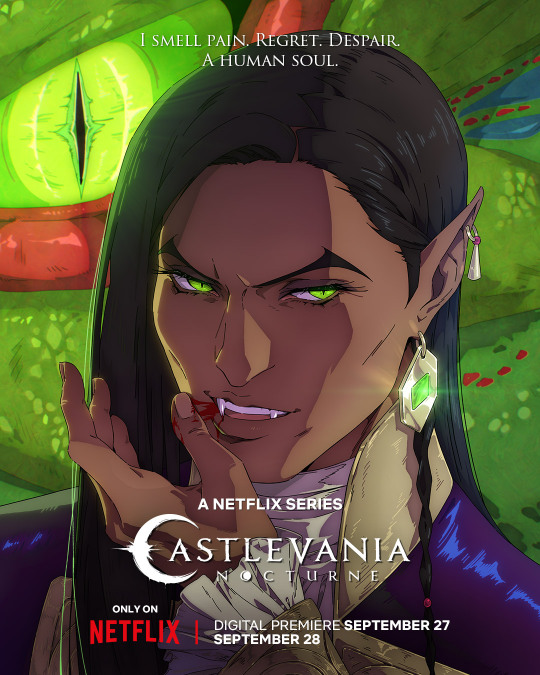
🇬🇧Remember this is just a hypothesis. Just till 2nd season premiere could see if I get right or not. / 🇪🇦 Recuerden que sólo es una hipótesis. Sólo hasta que salga la 2da temporada sabremos si acerté o no.
🇬🇧When the 1st season came out, we noticed that Count Olrox is now an Aztec vampire. I felt very interested because I'm Mexican 🇲🇽 and I wanted to know how could be his portrayal. On the 1st episode we can see that he transforms in a "Feathered snake", which I found very contradictory. / 🇪🇦 Cuando salió la 1ra temporada, nos dimos cuenta de que el Conde Olrox es ahora un vampiro azteca. Me interesó mucho porque soy mexicana 🇲🇽 y quería ver cómo podría ser su representación.
En el primer episodio, vemos que él se transforma en la "Serpiente emplumada", lo que encontré muy contradictorio.

🇬🇧I know that the original Olrox from Castlevania Symphony of the Night videogame transform on a giant reptile, but... The "Feathered snake" is related to the Aztec god Quetzalcoatl. Quetzalcoatl is an Aztec god who represents the light, the life, the wind, the fertility. Sometimes even he's related with the sun. That's why I found his transformation a kind of contradictory. / 🇪🇦 Se que el Olrox original de Castlevania Symphony of the Night se transforma en un reptil gigante, pero... La "Serpiente emplumada" está relacionada al dios azteca Quetzalcoatl. Quetzalcoatl es un dios azteca qué representa la luz, la vida, la Fertilidad. A veces está relacionado con el Sol. Es por eso que lo encontré contradictorio.

🇬🇧I found on a Facebook Castlevania fan group a proposal where Count Olrox Castlevania Nocturne is in reality the Aztec god "Tezcatlipoca" , or more specific, "The Black Tezcatlipoca" (black related to the color, not the race btw). And when I read that, I thought "That's more accurate and could be possible. Could explain his personality and his intentions. I'm going to explain why. / 🇪🇦 Encontré en un grupo de Facebook de Fans de Castlevania que alguien propuso en una publicación que Olrox es probablemente el dios Tezcatlipoca o específicamente el "Tezcatlipoca negro" (Negro por el color, no la raza por cierto). Cuando leí esto, pensé "Eso es más preciso y podría ser posible ". Explicaría muy bien su personalidad y sus intenciones. Y voy a explicar el por qué .
🇬🇧Tezcatlipoca is the contrary of the god Quetzalcoatl (Quetzalcoatl is also called the White Tezcatlipoca). / 🇪🇦 Tezcatlipoca es el contrario al dios Quetzalcoatl (Quetzalcoatl es llamado el Tezcatlipoca blanco).

🇬🇧Tezcatlipoca or the black Tezcatlipoca is a god of the darkness and the occult things, he has a fickle or whimsical personality. He's a god of the night and the temptations. Which matches perfectly with the personality of Olrox on the show. Olrox is a calculating man, manipulator, whom in many cases handle the things in his favor, his intentions always have a double intention on his actions. About being "tempting", well, that part was shown about how he makes Mizrak, a man of the church, fall to his temptations . /
🇪🇦 Tezcatlipoca o Tezcatlipoca negro es un dios de la oscuridad, lo invisible, de caracter voluble o caprichoso. Es un dios de la noche y las tentaciones. Eso cuadra perfectamente con la personalidad que ha mostrado en la serie. Olrox es un hombre calculador, manipulador, que en muchos casos maneja las cosas siempre a su favor, siempre hay una doble intención ante sus acciones. Y la parte de tentador quedó más que explícita al hacer que Mizrak, un hombre de la iglesia caiga a sus tentaciones.

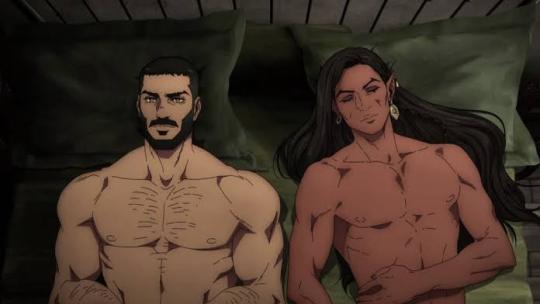
🇬🇧Also, Tezcatlipoca is called "The smoking mirror" because he used a shield made with obsidian that made smoke that was capable of killing his enemies. That was very clear when he uses the ability of "invoke phantasmagoric spirits" that seems they seem done of smoke. Matches with the abilities with his original version of the "Symphony of the Night " game and the Aztec myth. / 🇪🇦 Tezcatlipoca es llamado "espejo humeante" ya que usaba un escudo hecho de obsidiana que despedía un humo que era capaz de matar a sus enemigos. Eso queda más que claro al usar su habilidad de "invocar espíritus fantasmales" que parecen estar hechos de humo. Cuadra con las habilidades del Olrox original del juego "Symphony of the Night" y con el mito azteca.
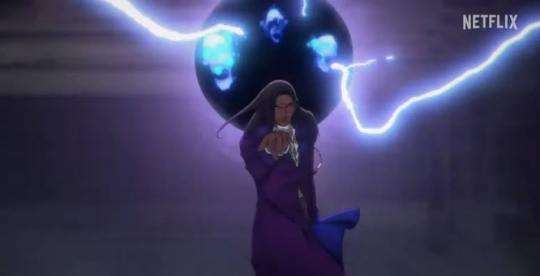
🇬🇧Many times I think about which were the reasons of Olrox to kill Julia, but not to Richter. Or why he said he wasn't in love with Mizrak but he decided to save him from Drolta and the night creatures made by Emmanuel. And for the both, the answer is the same. Richter Belmont or Mizrak, they will end up being sacrifices that Olrox will use to become stronger. / 🇪🇦 Muchas veces he pensado cuáles fueron sus motivos para asesinar a Julia Belmont pero no a Richter. O el por qué dijo que no estaba enamorado de Mizrak pero sí decidió salvarlo de Drolta y las otras criaturas nocturnas hechas por Emmanuel. Y creo que para ambos, la conclusión es la misma. Puede que Richter Belmont o Mizrak terminen siendo sacrificios que Olrox aprovechará para volverse más fuerte.

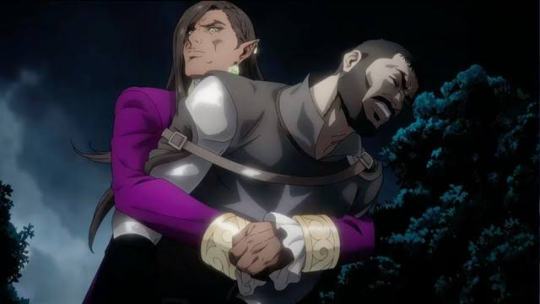
🇬🇧We need to remember that for different Aztec gods, they used to be made human sacrifices to feed the gods and regenerate their powers. And Tezcatlipoca was one of those gods. / 🇪🇦 Hay que recordar que para distintos dioses aztecas se solía hacer sacrificios humanos para alimentarlos y regenerar su poder. Y Tezcatlipoca era uno de esos dioses.
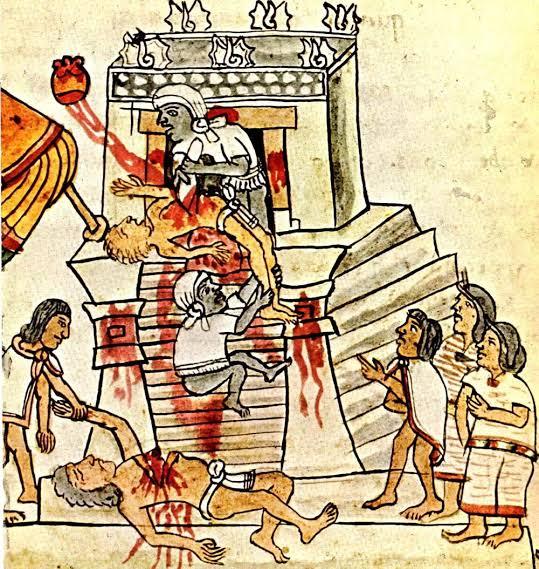
🇬🇧 Those who were elected for the rituals had to be young man, gracious, strong and had no blemish on their bodies, that last part could be understood as man of good intentions or pure heart, not making reference to the chastity. / 🇪🇦 Aquellos escogidos para los rituales debían de ser hombres jóvenes, agraciados, fuertes que no debían tener tacha alguna en su cuerpo; esto quizás podría ser más bien entendido como hombres de buenas intenciones o corazones puros, no tanto haciendo referencia a cuestiones relacionadas con la castidad.
🇬🇧So, in resume, any of two, Richter or Mizrak could end on a sacrificial stone to Olrox could be stronger now Erzsebeth has proclaimed herself as the "Vampire Messiah" could overthrow her. / 🇪🇦 Entonces, en resumen, alguno de los dos , Richter o Mizrak puede terminar sobre una piedra ritual para sacrificios para que Olrox pueda ser más fuerte, ahora que Erzsebeth se ha proclamado la "Mesías Vampiro", para poder derrocarla.
🇬🇧And that's all, folks!
What do you think?🤔
Which theories do you have of this character?🧠
I read you carefully . 👀 /
🇪🇦 Y bueno, eso es todo amigos.
¿Qué piensan ustedes? 🤔
¿Qué teorías tienen ustedes sobre este personaje? 🧠
Los leo atentamente. 👀
#castlevania netflix#castlevania nocturne#castlevania olrox#olrox#vampires#aztec#aztec mythology#aztec gods#aztec culture#azteca#cultura azteca#dioses aztecas#posting on two languages
13 notes
·
View notes
Text
racism in star wars will have wikis saying shit like "this species that is inspired on a real life non-white people is just too stupid to use the Force"
#hm i should make an original post tag#yes this is about tuskens#they 'lack mental capacity' to be jedi. according to some writer#which is fucking ridiculous#they have enough mental capacity to have two languages (spoken tusken and tusken sign language)#(they are usually seen being used together but they can be used independently)#just because they're nomadic and hostile to colonizers doesn't mean they're stupid. or lack the nuance to understand good and evil.#in me opinion there may not be any tusken jedi but for the same reason there's no bardottan jedi - they have their own force culture#they are hostile to outsiders and defensive of their people‚ of course they wouldn't let some foreign order take their children away#i think a force-sensitive tusken would be highly regarded in their tribe. being one with the universe is a special privilege.
678 notes
·
View notes
Text
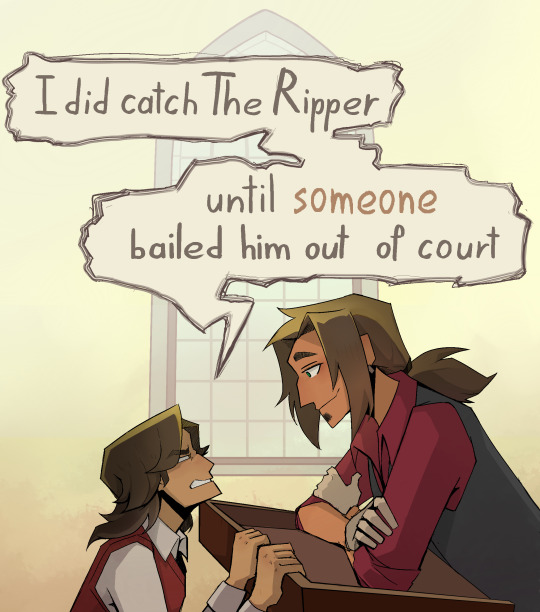
Day 7
Free-day (Out of order and late) Alenoah as Sherlock/Moriarty.
I like it when two characters play mind games and scheming against or with each other.
I didn`t plan to create an AU, but – my rant and bits of literature/character analysis (The Vision). Also, draw concept sketch.
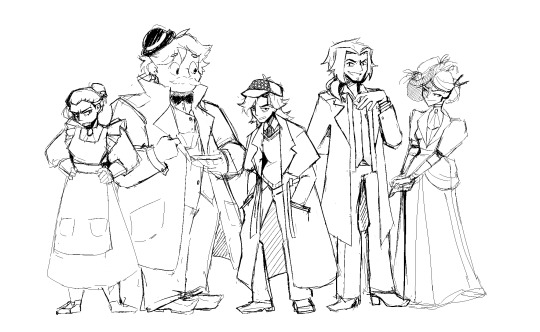
Noah (Detective Sherlock Holmes). I mean, they're both geniuses, introverts who don't care about social opinion and some versions depicted him as being good with dogs. In Victorian England, I totally see Noah opening a detective agency, because you either go working on a plant or you might use your geniuses’ intelligence to solve crimes, like game puzzles, and make monies to pay bills and buy new books because in 1800 many books were expensive and produced in small quantities.
Plus! I might look at this too far, but I think the Sherlock and Watson analogy was implemented in London episode when they strip team Chris just to Noah and Owen for investigation.
Owen (Dr. Watson). Basically in the original books, Watson plays the role of the guy, your typical visual novel MC, well narrator, who has character, but his whole purpose is just to be a witness to detectives doing, asking questions for the audience. This leads to usually representing Watson as either annoyed with Sherlock's antics or (usually in kids' media) naïve but with good intentions because of this simplification, to show his kindhearted nature in cartoons and caricatures he is portrayed as chubby, which is what we need! But all of them did service in the Anglo-Afghan War, even Disney version mentioned it. (Also if you want to do Nowen version of Jhonlock I don`t mind, sure go for it)
Alejandro (professor Moriarty). Do I really need to explain? Both archvillains in their stories. Professor, respected in society for his talent and achievements, wealthy, but behind all of that façade he`s "Napoleon of crime". He doesn’t usually do crimes himself but rather, schemes, orchestrates the events, or provides the plans that will lead to a successful crime, like paying money to a court so that someone can be released from prison.
Heather (Irene Adler). OK, in the original books (all books written not by Arthur Conan Doyle are basically fanfics) her character and Sherlock don`t date (But if you like, it`s fine). She was more like “I know what you are” towards him. I want to base it more on Warner Bros Sherlock where Irene works with Moriarty, but they also try to get rid of each other. She is also famous for blackmailing royals, If it isn`t most Heather thing I don`t know what is.
Eva (Mrs. Hudson). The landlady. I think it would be funny, she yelling at them to pay their bills in time.

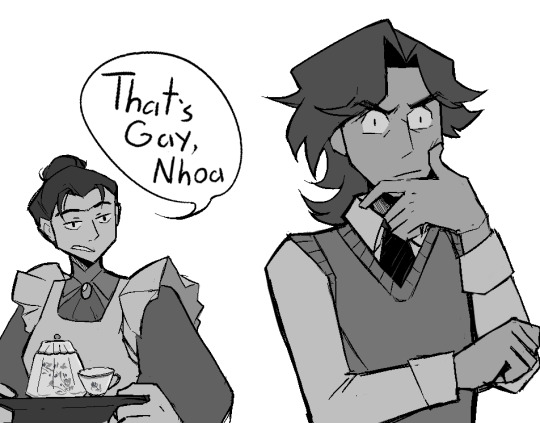
See you next week
#total drama#td noah#td alejandro#alenoah#td heather#td owen#td eva#alenoahweek2024#english not my first language#write it at night#i probably should have made several posts#I just combined two things that I love#sorry Eva#Sorry about the rant I try to restrain myself
625 notes
·
View notes
Text
“some great teamwork as well from Mr. Norris over here, keeping me in second” (bashful Lando smile)
x x





#landoscar#mctwinks#pls refer to my dissertation on how Lando and Oscar try and adapt to each others love languages and sob over this moment <3#ohhhhh they are dearer than anything I ever expect#seriously guys I’d have been fully fine all along as a charlos girly if these two had spats and battles like normal#twinklaren#bc they’d be absolutely fine just like Charles and Carlos are!#but the McLaren youths are still too tender and gently nuzzling around each other apparently#too young and sweet and kindly hopeful that even temporary acrimony can be avoided#no one talk to me a while I need to just#deal w how they are for a sec#EDIT SORRY THIS HAS ALREADY BEEN POSTED SPRRY
189 notes
·
View notes
Note
hello lovie! would it be possible to do a T141 with an american S/O? It always makes me giggle when i read them to see the culture differences! thank you lovie!!
Hey! Not gonna lie, I think all of them would almost get a heart attack from the culture shock! I know I do everytime I talk to my American friend! Also, I am neither British nor American, so I don't know a whole lot about either of those countries! I based this off of what my American friends have told me about the States!
TF141 with an American!Reader
Price: The moment you tell him about any of the human rights violations that are completely normal to you regarding your work he feels as though he’s going to die of a culture shock. What the hell do you mean you don’t get paid vacation??? He gets a whooping 28 days off, so why don’t you??? If you even get any days off in the first place. And then there’s the fact that you need to “earn” your sick days. What the hell??? What kind of shithole are the United States if you can’t even stay home when you’re sick??? I feel as though you could genuinely stun him into silence if you tell him those things like they’re the most normal thing in the world. He’s going to grow very concerned with you. Don’t you want to move in with him instead? Live in a new country that respects your rights as a human being at least somewhat? He will genuinely offer you to move in with him here and there, especially if you tell him some more concerning things. Theft at work? Just by picking up a pen from the ground? Really? The more you tell him about the States, the more he comes to resent that country.
Gaz: Oh, the two of you are gonna be arguing a lot. He’s well aware that there are quite a few regional differences with words, but Gaz is going to pretend he’s always right, even if he knows that there’s no right or wrong. Ghost is a leftenant, not a lieutenant. Those are chips and not fries. Love, that’s a bloody biscuit. He smirks at you every time he mentions his superior British English. Call him a colonizer and he’ll shut up, though. In fact, he’ll be super shocked. Seriously? You joke about that? He doesn’t make any jokes about 9/11 either, for example. It’s very surprising to hear how chill you actually are about 9/11, considering how much bad it brought with it. He doesn’t dare to make any jokes about it. He’ll call you Mr./Mx. Oppenheimer, though. He knows it’s disrespectful towards Japan, but if you have the audacity to call him a colonizer of all things, surely you can take a little joke. You gonna shoot the missiles, love? Gonna go to bloody Walmart and buy an AK-47? He loves you, but man, if he doesn’t need to be there, he doesn’t want to go to the US either.
Ghost: You’re a very perplexing creature. Because??? How can one human being be this loud in public??? Are you not afraid of being judged??? Of getting bludgeoned to death because you looked at a YouTube Short in public??? Naturally, he’ll protect you, but man, you’re very daring. Besides, how can you just??? Walk up to people and talk to them like that??? You don’t know them and you weren’t forced to talk to them either?????? Sure, you’re friendly but?????? Are you not afraid of getting judged in public for your accent or dialect??? You’re an American in England, people are gonna mock you??? You seem to take it in stride, though. Good on you for that one, lovie. But are all Americans willing to be this social??? Do you just walk up to people all the time and talk to them??? Do you not mind your own business at all times??? Congratulations, you’ve confused this man beyond repair just by being American and being a little bit social. Also, how in the world are you this touchy? Just because his touch starvation kills him doesn’t mean he’s gonna do anything about it. And yet here you are, hugging someone you’ve met a few hours ago. What???????
Soap: For Soap, it’s the small things that confuse him. Like, do you just guesstimate how much you pay at the store? Bonnie, what the hell do you mean YOUR STORES DON’T INCLUDE TAXES IN THEIR PRICES?? Also, bonnie, you can actually rely on public transport here in the UK. It’s okay, you don’t have to be afraid of the double decker bus or the metro. Because why in the world do you need a car to get literally anywhere in the world??? Also, why do your housing estates look like that?? It’s all squares?? He’s never gonna let you live down how ugly it all looks. Besides, your houses can literally be blown away this easily as well. You should come live in Scotland with him. This is not a suggestion, by the way, as you will be living there with him eventually. He refuses to live in the US. He’s gonna show you how nice Scotland really is! In fact, he’s gonna give you your very own kilt as well! It’s very comfortable, you should know! This, in actuality, is a bribe to get you to forget about the US. Please, never mention them again. They’re the peace police, but no one likes them, bonnie!!!
#cod#cod x reader#call of duty#call of duty x reader#john price#john price x reader#price x reader#kyle gaz garrick#kyle gaz garrick x reader#gaz x reader#simon ghost riley#simon ghost riley x reader#ghost x reader#john soap mactavish#john soap mactavish x reader#soap x reader#not gonna lie the states sound awful#I know there are a lot of patriots there but man. I'm so glad I'm European#I feel like I would have been killed in the States by now#or at least I'd be even more miserable than I am here because I can't afford the doctor or my medication#no. I like Europe#It's far from perfect but at least I get health insurance just by working. getting 25 days paid vacation is apparently a bonus#also I get to be sick whenever I am actually sick. I didn't know that was actually a privilege#I'm sure it's a beautiful country. And I really like the English language. But I'm so glad I'm not flying there anymore#How are you not afraid of just randomly getting shot??? I'd be terrified every day#Also I'm not posting a request tomorrow due to personal reasons. But two random blurbs instead :>
230 notes
·
View notes
Text
Double Indemnity, Veritas Ratio and Aventurine

This was originally a part of my compilation post as a short analysis on the Double Indemnity references, linking to this great thread by Manya on Twitter. However, I've recently watched the movie and found that the parallels run much deeper than just the mission name and the light cone itself, plus as the short synopsis I've read online. Since there isn't really an in-depth attempt at an analysis on the film in relation to the way Aventurine and Ratio present themselves throughout Penacony, I thought I'd take a stab at doing just that. I will also be bringing up things from Manya's thread as well as another thread that has some extra points.
Disclaimer that I... don't do analyses very often. Or write, in general — I'm someone who likes to illustrate their thoughts (in the artistic sense) more than write. There's just something about these two that makes me want to rip into them so badly, so here we are. If there's anything you'd like to add or correct me on, feel free to let me know in the replies or reblogs, or asks. This ended up being a rather extensive deep dive into the movie and its influences on the pairing, so please keep that in mind when pressing Read More.
There are two distinct layers on display in Ratio and Aventurine's relationship throughout Penacony, which are references to the two most important relationships in the movie — where they act like they hate/don’t know each other, and where they trust each other.
SPOILER WARNING for the entire movie, by the way. You can watch the film for free here on archive.org, as well as follow along with the screenplay here. I will also be taking dialogue and such from the screenplay, and cite quotes from the original novel in its own dedicated section. SPOILER WARNING for the Cat Among Pigeons Trailblaze mission, as well.

CONTENT WARNING FOR MENTIONS OF SUICIDE. YOU HAVE BEEN WARNED.
To start, Double Indemnity (1944) is a film noir by Billy Wilder (and co-written by Raymond Chandler) based on the novel of the same name by James M. Cain (1927). There are stark differences between the movie adaptation and the original novel which I will get into later on in this post, albeit in a smaller section, as this analysis is mainly focused on the movie adaptation. I will talk about the basics (summaries for the movie and the game, specifically the Penacony mission in tandem with Ratio and Aventurine) before diving into the character and scene parallels, among other things.

—
[THE NAME]
The term "double indemnity" is a clause in which if there’s a case of accidental death of a statistically rare variety, the insurance company has to pay out multiple of the original amount. This excludes deaths by murder, suicide, gross negligence, and natural causes.

The part of the mission in Cat Among Pigeons where Ratio and Aventurine meet with Sunday is named after the movie. And before we get further into things, let's get this part out of the way: The Chinese name used in the mission is the CN title of the movie, so there's no liberties taken with the localization — this makes it clear that it’s a nod to the movie and not localization doing its own thing like with the mission name for Heaven Is A Place On Earth (EN) / This Side of Paradise (人间天堂) (CN).

—
[SUMMARY OF THE 1944 MOVIE]
Here I summarised the important parts that will eventually be relevant in the analysis related to the game.

Insurance salesman Walter Neff, wounded from a gunshot, enters his office and confesses his crime on a dictaphone to his boss Barton Keyes, the claims manager. Much earlier, he had met Phyllis Dietrichson, the wife of Mr. Dietrichson and former nurse. Neff had initially wanted to meet Mr. Dietrichson because of car insurance. Phyllis claims her husband is mean to her and that his life insurance goes to his daughter Lola. With Neff seduced by Phyllis, they eventually brew up a scheme to murder Mr. Dietrichson in such a way that they activate the "double indemnity" clause, and the plan goes off almost perfectly. Initially, the death is labeled a suicide by the president of the company, Norton.
Keyes finds the whole situation suspicious, and starts to suspect Phyllis may have had an accomplice. The label on the death goes from accidental, to suicide, to then murder. When it’s ruled that the husband had no idea of the accidental policy, the company refuses to pay. Neff befriends Phyllis’ stepdaughter Lola, and after finding out Phyllis may have played a part in the death of her father’s previous wife, Neff begins to fear for Lola and himself, as the life insurance would go all towards her, not Phyllis.
After the plan begins to unravel as a witness is found, it comes out that Lola’s boyfriend Nino Zachette has been visiting Phyllis every night after the murder. Neff goes to confront Phyllis, intending to kill her. Phyllis has her own plans, and ends up shooting him, but is unable to fire any more shots once she realises she did love him. Neff kills her in two shots. Soon after telling Zachette not to go inside the house, Neff drives to his office to record the confession. When Keyes arrives, Neff tells him he will go to Mexico, but he collapses before he could get out of the building.
—
[THE PENACONY MISSION TIMELINE]

I won’t be summarising the entirety of Aventurine and Ratio’s endeavours from the beginning of their relationship to their final conversation in Heaven Is A Place On Earth the same way as I summarised the plot of the movie, so I will instead present a timeline. Bolded parts means they are important and have clear parallels, and texts that are in [brackets] and italics stand for the names of either the light cone, or the mission names.
[Final Victor] Their first meeting. Ratio’s ideals are turned on its head as he finally meets his match.
Several missions happen in-between their first encounter and the Penacony project. They come to grow so close and trusting with each other that they can guess, understand each other’s thoughts, way of thinking and minds even in high stakes missions. Enough to pull off the Prisoner’s Dilemma (Aventurine’s E1) and Stag Hunt Game (Aventurine’s E6) and come out on top.
Aventurine turns towards Ratio for assisting him in the Penacony project. Ratio's involvement in the project is implied to be done without the knowledge of Jade, Topaz, and the IPC in general, as he was only sent to Penacony to represent the Intelligentsia Guild, and the two other Stonehearts never mention Ratio.
Aventurine and Ratio cook up the plan to deceive Sunday before ever setting foot on Penacony. Aventurine does not tell Ratio the entirety of his plan.
Aventurine convinces Topaz and Jade to trust him with their Cornerstones. Aventurine also breaks his own Cornerstone and hides it along with the jade within a bag of gift money.
[The Youth Who Chase Dreams] They enter Penacony in the Reverie Hotel. Aventurine is taken to the side by Sunday and has all his valuables taken, which includes the gift money that contains the broken aventurine stone, the jade, and the case containing the topaz.
Aventurine and Ratio speak in a “private” room about how Aventurine messed up the plan. After faking an argument to the all-seeing eyes of Sunday, Ratio leaves in a huff.
Ratio, wearing his alabaster head, is seen around Golden Hour in the (Dusk) Auction House by March 7th.
[Double Indemnity] Ratio meets up with Sunday and “exposes” Aventurine to him. Sunday buys his “betrayal”, and is now in possession of the topaz and jade. Note that this is in truth Ratio betraying Sunday all along.
Ratio meets up with Aventurine again at the bar. Ratio tells Aventurine Sunday wants to see him again.
They go to Dewlight Pavilion and solve a bunch of puzzles to prove their worth to Sunday.
They meet up with Sunday. Sunday forces Aventurine to tell the truth using his Harmony powers. Ratio cannot watch on. It ends with Aventurine taking the gift money with his Cornerstone.
[Heaven Is A Place On Earth] They are in Golden Hour. Ratio tries to pry Aventurine about his plan, but Aventurine reins him in to stop breaking character. Ratio gives him the Mundanite’s Insight before leaving. This is their final conversation before Aventurine’s grandest death.
Now how exactly does the word “double indemnity” relate to their mission in-game? What is their payout? For the IPC, this would be Penacony itself — Aventurine, as the IPC ambassador, handing in the Jade Cornerstone as well as orchestrating a huge show for everybody to witness his death, means the IPC have a reason to reclaim the former prison frontier. As for Ratio, his payout would be information on Penacony’s Stellaron, although whether or not this was actually something he sought out is debatable. And Aventurine? It’s highly implied that he seeks an audience with Diamond, and breaking the Aventurine Cornerstone is a one way trip to getting into hot water with Diamond. With Aventurine’s self-destructive behaviour, however, it would also make sense to say that death would be his potential payout, had he taken that path in the realm of IX.
Compared to the movie, the timeline happens in reverse and opposite in some aspects. I will get into it later. As for the intended parallels, these are pretty clear and cut:
Veritas Ratio - Walter Neff
Aventurine - Phyllis Dietrichson
Sunday - Mr. Dietrichson

There is one other character who I feel also is represented in Ratio, but I won’t bring them up until later down the line.
For the sake of this analysis, I won’t be exploring Sunday’s parallel to Mr. Dietrichson, as there isn’t much on Dietrichson’s character in the first place in both the movie and the novel. He just kind of exists to be a bastard that is killed off at the halfway point. Plus, the analysis is specifically hyper focused on the other two.
—
[SO, WHAT’S THE PLAN?]
To make things less confusing in the long run whenever I mention the words “scheme” and “plan”, I will be going through the details of Phyllis and Neff’s scheme, and Aventurine and Ratio’s plan respectively. Anything that happens after either pair separate from another isn’t going to be included. Written in a way for the plans to have gone perfectly with no outside problems.

Phyllis and Neff —> Mr. Dietrichson
Goal: Activate the double indemnity clause by killing Mr. Dietrichson and making it look like a freak train accident
Payout: Twice or more of the face value of the life insurance ($100,000)
Main Actor: Walter Neff | Accomplice: Phyllis Dietrichson
During the entire time until the payout, Phyllis and Neff have to make sure to any outsiders that they look like complete strangers instead of lovers in an affair.
Step-by-step:
Neff convinces Mr. Dietrichson to sign the policy with the clause without him suspecting foul play, preferably with a third party to act as an alibi. This is done discreetly, making Mr. Dietrichson not read the policy closely and being told to just sign.
Neff and Phyllis talk to each other about small details through the phone (specified to be never at Phyllis’ own house and never when Neff was in his office) and in the marketplace only, to make their meetings look accidental. They shouldn’t be seen nor tracked together, after all.
Phyllis asks Mr. Dietrichson to take the train. She will be the one driving him to the train station.
On the night of the murder, after making sure his alibi is airtight, Neff sneaks into their residence and hides in their car in the second row seating, behind the front row passenger seat. He wears the same colour of clothes as Mr. Dietrichson.
Phyllis and Mr. Dietrichson get inside the car — Phyllis in the driver’s seat and Mr. Dietrichson in the passenger seat. Phyllis drives. On the way to the train station, she makes a detour into an alley. She honks the horn three times.
After the third honk, Neff breaks Mr. Dietrichson’s neck. The body is then hidden in the second row seating under a rug.
They drive to the train station. Phyllis helps Neff, now posing as Mr. Dietrichson, onto the train. The train leaves the station.
Neff makes it to the observation platform of the parlour car and drops onto the train tracks when nobody else is there.
Phyllis is at the dump beside the tracks. She makes the car blink twice as a signal.
The two drag Mr. Dietrichson’s corpse onto the tracks.
They leave.
When Phyllis eventually gets questioned by the insurance company, she pretends she has no idea what they are talking about and eventually storms off.
Phyllis and Neff continue to lay low until the insurance company pays out.
Profit!
Actual Result: The actual murder plan goes almost smoothly, with a bonus of Mr. Dietrichson having broken a leg. But with him not filing a claim for the broken leg, a witness at the observation platform, and Zachette visiting Phyllis every night after the murder, Keyes works out the murder scheme on his own, but pins the blame on Phyllis and Zachette, not Neff.

Now for Aventurine and Ratio. You can skip this section if you understand how deep their act goes, but to those who need a refresher, here’s a thorough explanation:
Aventurine and Ratio —> Sunday
Goal: Collect the aventurine stone without Sunday knowing, ruin the dream (and create the grandest death)
Payout: Penacony for the IPC, information on the Stellaron for Ratio, a meeting with Diamond / death for Aventurine
Main Actor: Aventurine | Accomplice: Veritas Ratio
From the moment they step onto Penacony, they are under Sunday’s ever present and watchful eyes. “Privacy” is a foreign word to The Family. They have to act like they don’t like each other’s company the entire time and feed Sunday information through indirect means so that the eventual “betrayal” by Ratio seems truthful to Sunday. Despite what it looks like, they are closer than one would ever think, and Ratio would never sell out a person purely for information.
Step-by-step:
After Sunday takes away the bag of gift money and box, Aventurine and Ratio talk in a room in the Reverie Hotel.
Aventurine establishes the Cornerstones’ importance, and how he lost the gift money and the case containing the Cornerstones to Sunday. Ratio turns to leave, saying “some idiot ruined everything”, meaning the Cornerstones were vital to their plan. (Note that Ratio is not wearing his alabaster head while saying it to said “idiot”.)
Aventurine then proceeds to downplay the importance of the Cornerstones, stating they are “nothing more than a few rocks” and “who cares if they are gone”. This lets Sunday know that something suspicious may be going on for him to act like it’s nothing, and the mention of multiple stones, and leaves him to look up what a Cornerstone is to the Ten Stonehearts of the IPC.
Ratio points out his absurd choice of outfit, mentioning the Attini Peacock and their song.
Ratio implies that without the aventurine stone, he is useless to the IPC. He also establishes that Aventurine is from Sigonia(-IV), and points out the mark on his neck. To Sunday, this means that Aventurine is shackled to the IPC, and how Aventurine may possibly go through extreme lengths to get the stone back, because a death sentence always looms above him.
Aventurine claims Ratio had done his homework on his background, which can be taken that this is their very first time working together. (It isn’t, and it only takes one look to know that Aventurine is an Avgin because of his unique eyes, so this comment does not make sense even in a “sincere” way, a running theme for the interaction.)
Ratio mentions how the true goal is to reclaim Penacony for the IPC, establishing their ulterior motive for attending the banquet.
Ratio asks if Aventurine went to pre-school in Sigonia after saying trust was reliant on cooperation. Aventurine mentions how he didn’t go to school and how he doesn’t have any parents. He even brings up how friends are weapons of the Avgins. This tells Sunday that the Avgins supposedly are good at manipulation and potentially sees Ratio possibly betraying Aventurine due to his carelessness with his “friends”. Sunday would also then research about the Avgins in general (and research about Sigonia-IV comes straight from the Intelligentsia Guild.)
Ratio goes to Dewlight Pavilion in Sunday’s Mansion and exposes a part of Aventurine’s “plan”. When being handed the suitcase, Ratio opens it up due to his apparent high status in the IPC. He tells Sunday that the Cornerstone in the suitcase is a topaz, not an aventurine, and that the real aventurine stone is in the bag of gift money. This is a double betrayal — on Aventurine (who knows) and Sunday (who doesn’t). Note that while Ratio is not officially an IPC member in name — the Intelligentsia Guild (which is run by the IPC head of the Technology Department Yabuli) frequently collaborates with the IPC. Either Aventurine had given him access to the box, or Ratio’s status in general is ambiguous enough for Sunday not to question him further. He then explains parts of Aventurine’s gamble to Sunday in order to sell the betrayal. Note that Ratio does not ever mention Aventurine’s race to Sunday.
Ratio brings Aventurine to Sunday. Aventurine offers help in the investigation of Robin's death, requesting the gift money and the box in return.
Sunday objects to the trade offer. Aventurine then asks for just the bag. A classic car insurance sales tactic. Sunday then interrogates Aventurine, and uses everything Ratio and Aventurine brought up in the Reverie Hotel conversation and their interactions in the Mansion, as well as aspects that Ratio had brought up to Sunday himself.
Aventurine feigns defeat and ignorance enough so that Sunday willingly lets him go with the gift bag. After all is said and done, Aventurine leaves with the gift money, where the Aventurine Cornerstone is stored all along.
Ratio and Aventurine continue to pretend they dislike each other until they go their separate ways for their respective goals and plans. Aventurine would go on to orchestrate his own demise at the hands of Acheron, and Ratio… lurks in the shadows like the owl he is.
Profit!
Actual Result: The plan goes perfectly, even with minor hiccups like Ratio coming close to breaking character several times and Aventurine being sentenced to execution by Sunday.
This is how Sunday uses the information he gathered against Aventurine:
• Sunday going on a tirade about the way Aventurine dresses and how he’s not one to take risks — Ratio’s comment about Aventurine’s outfit being peacock-esque and how he’s “short of a feather or two”.
• “Do you own a Cornerstone?” — Ratio talked about the aventurine stone.
• “Did you hand over the Cornerstone to The Family when you entered Penacony?” — Aventurine mentioned the box containing the Cornerstones.
• “Does the Cornerstone you handed over to The Family belong to you?” — Aventurine specifically pluralized the word Cornerstone and “a bunch of rocks” when talking to Ratio.
• “Is your Cornerstone in this room right now?” — The box in the room supposedly contained Aventurine’s own cornerstone, when Aventurine mentioned multiple stones.
• “Are you an Avgin from Sigonia?” —Aventurine mentioned that he’s an Avgin, and Ratio brought up Sigonia.
• “Do the Avgins have any ability to read, control, and manipulate one’s own or another’s minds?” — Aventurine’s comment on how friends are weapons, as well as Sunday’s own research on the Avgins, leading him to find out about the negative stereotypes associated with them.
• “Do you love your family more than yourself?” — His lost parents.
“All the Avgins were killed in a massacre. Am I right?” — Based on Sunday’s research into his background.
• “Are you your clan’s sole survivor?” — Same as the last point.
“Do you hate and wish to destroy this world with your own hands?” — Ratio mentioned the IPC’s goal to regain Penacony, and Aventurine’s whole shtick is “all or nothing”.
• “Can you swear that at this very moment, the aventurine stone is safe and sound in this box?” — Repeat.
As seen here, both duos have convoluted plans that involve the deception of one or more parties while also pretending that the relationship between each other isn’t as close as in reality. Unless you knew both of them personally and their histories, there was no way you could tell that they have something else going on.
On to the next point: Comparing Aventurine and Ratio with Phyllis and Neff.
—
[NEFF & PHYLLIS — RATIO & AVENTURINE]

With the short summaries of the movie and the mission out of the way, let’s look at Phyllis and Neff as characters and how Aventurine and Ratio are similar or opposite to them.

Starting off with Aventurine and Phyllis. Here is where they are the most similar:
Phyllis is blonde and described as a provocative woman. Aventurine is also a blond and eyes Ratio provocatively in the Final Victor light cone.
Phyllis was put under surveillance after Keyes starts figuring out that the so-called accidental death/suicide may have been a murder after all. Similarly, Aventurine was watched by Sunday the entire time in Penacony.
Phyllis never tells Neff how she's seeing another man on the side to possibly kill him too (as well as how she was responsible for the death of her husband‘s previous wife). Aventurine also didn't tell Ratio the entirety of his plan of his own death.
Phyllis puts on a somewhat helpless act at first but is incredibly capable of making things go her way, having everything seemingly wrapped around her finger. Aventurine — even when putting on a facade that masks his true motives — always comes out at the top.
Now the differences between Aventurine and Phyllis:
Phyllis does not care about her family and has no issue with killing her husband, his previous wife, and possibly her daughter Lola. Opposite of that, Aventurine is a family man… with no family left, as well as feeling an insane level of survivor’s guilt.
Really, Phyllis just… does not care at all about anyone but herself and the money. Aventurine, while he uses every trick in the book to get out on top, does care about the way Jade and Topaz had entrusted him with their Cornerstones, in spite of the stones being worth their lives.
Phyllis also uses other people to her advantage to get what she wants, often behind other people's backs, with the way she treats Neff and Zachette. Aventurine does as well (what with him making deals with the Trailblazer while also making a deal with Black Swan that involves the Trailblazer). The difference here is Phyllis uses her allure deliberately to seduce men while Aventurine simply uses others as pawns while also allowing others to do the same to himself.
Phyllis makes no attempt at compromising the policy when questioned by Norton. Aventurine ends up compromising by only taking the gift money (which is exactly what he needs).
The wig that Barbara Stanwyck (the actress of Phyllis) wore was chosen to make her look as “sleazy” as possible, make her look insincere and a fraud, a manipulator. A sort of cheapness. Aventurine’s flashy peacock-esque outfit can be sort of seen as something similar, except the outfit isn’t cheap.

Moving on to Ratio’s similarities to Neff… There isn’t much to extrapolate here as Ratio is more of a side character in the grand scheme of Penacony, however this is what I’ve figured out.
Neff has dark hair. Ratio has dark purple hair.
Neff almost never refers to Phyllis by her name when speaking with her, only as “baby”. The few times he refers to her as Phyllis or Mrs. Dietrichson is during their first conversations and when he has to act like he doesn’t know her. Ratio never calls Aventurine by his name when he’s around him — only as “gambler”, sometimes “damned” or “dear” (EN-only) gambler. Only in the Aventurine's Keeping Up With Star Rail episode does Ratio repeatedly say his name, and yet he still calls him by monikers like “gambler” or, bafflingly, a “system of chaos devoid of logic”.
Both Neff and Ratio committed two betrayals: Neff on Mr. Dietrichson and Keyes, and Ratio on Sunday and Aventurine. With the former cases it was to reach the end of the trolley line, and with the latter it was on a man who had put his trust in him.
As for the differences…
Neff is described as someone who’s not smart by his peers. Ratio is someone who is repeatedly idolised and put on a pedestal by other people.
Neff is excellent at pretending to not know nor care for Phyllis whenever he speaks about her with Keyes or when he and she are in a place that could land them in hot water (the office, the mansion when there are witnesses). His acting is on the same level as Phyllis. With Ratio it’s… complicated. While he does pull off the hater act well, he straight up isn’t great at pretending not to care about Aventurine’s wellbeing.
Instead of getting his gunshot wound treated in the hospital like a normal person, Neff makes the absolutely brilliant decision of driving to his office and talking to a dictaphone for hours. Needless to say, this is something a medical doctor like Ratio would never do.

Now here's the thing. Though it's very easy to just look at Phyllis and Neff in the movie and go "okay, Aventurine is Phyllis and Ratio is Neff — end of story" and leave it at that, I find that they both take from the two leads in different ways. Let me explain. Beginning with Aventurine and Neff…
Neff is the one who hatches the plan and encourages Phyllis to go through and claim the double indemnity clause in the first place. He is also the key player of his own risky plan, having to fake being the husband to enter the train as well as fake the death. Aventurine puts himself at great risk just by being in Sunday’s presence, and hoping that Sunday wouldn’t figure out that the green stone he had uncovered wasn’t the aventurine stone.
Adding onto the last point, Neff had fantasised about pulling off the perfect murder for a long time — the catalyst was simply him meeting Phyllis. Aventurine presumably sought out Ratio alone for his plan against Sunday.
Neff makes a roulette wheel analogy and talks about a pile of blue and yellow poker chips (the latter in the script only). I don‘t even have to explain why this is relevant here. (Aventurine’s Ultimate features a roulette wheel and the motif is on his belt, thigh strap, and back, too. And of course, Aventurine is all about his chips.)
Neff has certain ways to hide when he’s nervous, which include hiding his hands in his pockets when they were shaking, putting on glasses so people couldn’t see his eyes. Aventurine hides his left hand behind his back when he’s nervous: Future Aventurine says that "they don't know the other hand is below the table, clutching [his] chips for dear life", and in multiple occasions such as the Final Victor LC, his character trailer, and even in his boss form in the overworld you can see that Aventurine hides his left hand behind his back. And he is also seen with his glasses on sometimes.
Neff says a bunch of stuff to make sure that Phyllis acts her part and does not act out of character (i.e. during their interactions at the market), like how Aventurine repeatedly tries to get Ratio back on track from his subpar acting.
Neff is always one step ahead of the game, and the only reason the plan blows up in his face is due to outside forces that he could not have foreseen (a witness, Keyes figuring out the plan, the broken leg). Aventurine meanwhile plays 5D chess and even with the odds against him, he uses everything he can to come out on the top (i. e. getting Acheron to kill him in the dream).
Even after coming home on the night of the murder, Neff still felt that everything could have gone wrong. Aventurine, with his blessed luck, occasionally wavers and fears everything could go wrong whenever he takes a gamble.
Neff was not put under surveillance by Keyes due to him being extensive with his alibi. After witnessing Robin’s death with eyewitnesses at the scene, the Family had accepted Aventurine’s alibi, though he would be under watch from the Bloodhounds according to Ratio.
Neff talks about the entire murder scheme to the dictaphone. Aventurine during Cat Among Pigeons also retells his plan, albeit in a more convoluted manner, what with his future self and all.

Continuing with Ratio and Phyllis, even with their personalities and motivations being quite different, they do have a few commonalities.
Phyllis was a nurse. Ratio is a medical doctor.
Her name is Greek of origin. Veritas Ratio, though his name is Latin, has Greco-Roman influences throughout his entire character.
The very first scene Phyllis appears in has her wearing a bath towel around her torso. Ratio loves to take baths to clear his mind.
Phyllis was instructed by Neff to be at the market every morning at eleven buying things. Ratio is seen in an auction house with his alabaster head on so no one could recognize him.
Phyllis mostly acts as an accomplice to the scheme, being the one to convince her husband to take the train instead. She is also generally seen only when Neff is involved. Ratio plays the same role as well, only really appearing in the story in relation to Aventurine as well as being the accomplice in Aventurine’s own death. Even him standing in the auction house randomly can be explained by the theory that he and Aventurine had attempted to destabilise Penacony’s economy through a pump and dump scheme.
With these pointers out of the way, let’s take a closer look at select scenes from the film and their relation to the mission and the pair.
—
[THE PHONE CALL — THE REVERIE HOTEL]

Before the murder, there is a scene with a phone call between Phyllis and Neff discussing the plan while Keyes is in the same room as Neff. Neff has to make sure that Keyes doesn’t think of anything of the phone call, so he acts like he’s calling a “Margie”, and says a bunch of stuff that sounds innocent out of context (“Can’t I call you back, ‘Margie’?” “What color did you pick out?” “Navy blue. I like that fine”), but are actually hinting at the real plan all along (the suit that Mr. Dietrichson wears.)
In a roundabout way, the conversation between Ratio and Aventurine in the Reverie Hotel can be seen as the opposite of that scene — with the two talking about their supposed plan out loud on Penacony ground, a place where the Family (and in turn, Sunday) has eyes everywhere. Despite being in a “private” room, they still act like they hate each other while airing out details that really do not make sense to air out if they really did meet the first time in Penacony (which they didn’t — they’ve been on several missions beforehand). It’s almost like they want a secret third person to know what they were doing, instead of trying to be hushed up about it. The TVs in the room that Sunday can look through based on Inherently Unjust Destiny — A Moment Among The Stars, the Bloodhound statue that disappears upon being inspected, the owl clock on the left which side eyes Ratio and Aventurine, all point to that Sunday is watching their every move, listening to every word.
Rewinding back to before the phone call, in one of the encounters at the marketplace where they “accidentally” run into each other, Phyllis talks about how the trip was off. How her husband wouldn’t get on the train, which was vital for their plan, because of a broken leg. All this, while pretending to be strangers by the passersby. You could say that the part where Ratio almost leaves because Aventurine had “ruined the plan” is the opposite of this, as the husband breaking his leg was something they couldn’t account for, while Aventurine “being short of a few feathers” was entirely part of the plan.
—
[QUESTIONING PHYLLIS — THE INTERROGATION]

This section is going to be a little longer as I will cover two scenes in the movie in a more detailed manner — Mr. Dietrichson signing the policy, and Phyllis being questioned — and how they are represented in the Sunday-Aventurine interrogation and the prior conversation between Ratio and Sunday in multitudes of ways.
Going about their plan, Neff has to make sure that Mr. Dietrichson signs the policy with the double indemnity clause without him knowing the details, all the while having Phyllis (and Lola) in the same room. He and Phyllis have to pretend that they don’t know each other, and that this is just the standard accidental insurance process, instead of signing what would be his downfall. To sell it, he gets Mr. Dietrichson to sign two “copies” of the form, except with Mr. Dietrichson’s second signature, he’s duped into signing the accident insurance policy with the respective clause.
You can tie this to how Ratio goes to Sunday in order to “expose” the lie that the suitcase didn’t actually contain the Aventurine Cornerstone, as well as there being more than one Cornerstone involved in the scheme. Ratio must make sure that Sunday truly believes that he dislikes Aventurine’s company, while also making sure that Sunday doesn’t figure out the actual aventurine stone is broken and hidden in the gift bag. The scheme turns out to be successful, as Sunday retrieves the two Cornerstones, but not the aventurine stone, and truly does think that the green stone he has in his possession is the aventurine.

This whole scene with Sunday is also reminiscent of the interrogation scene in the middle of the movie, where Phyllis was questioned by the boss (Norton) who was deducing that Mr. Dietrichson's death was a suicide, not accidental death. Neff, Phyllis, Keyes and Norton were all in the same room, and Neff and Phyllis had to act like they never knew the other. Phyllis acts like she knows nothing about what Norton insinuates about her husband and eventually, Phyllis explodes in anger and storms out the room, even slamming the door. Her act is very believable to any outsider.

Now back to the Ratio and Sunday conversation. One glaring difference between the movie and here is that his acting isn’t great compared to either Phyllis nor Neff. It never was throughout the Penacony mission. He even comes very close to breaking character several times, and is even defending Aventurine in a somewhat aggressive manner during his one-on-one conversation with Sunday, as in he literally tells Sunday to see a shrink. It’s very different from the way he was acting in Herta Space Station — like Ratio cares about Aventurine too much to keep his hands off.
It's also worth pointing out that Neff doesn't speak a word when Phyllis was being interrogated. Similarly, Ratio is silent throughout the entire scene with Sunday and Aventurine, with his only “line” being a “hm”. When Aventurine calls him a wretch to his face, all he does is look to the side. In fact, he can only look at Aventurine when the other isn’t staring back. Almost like him uttering a single word would give them away. Or his acting is terrible when it has to do with Aventurine, as he has no issue doing the same thing in Crown of the Mundane and Divine (Mundane Troubles).
So, Sunday finds out about the Cornerstones and reveals them to Aventurine, and reasons that he cannot give them back to him because Aventurine had lied. Note that in that same scene, Aventurine attempted to use the two murders that had occurred beforehand against Sunday to retrieve his own cornerstone. Similarly, when it was revealed that Mr. Dietrichson did not know about the accident policy and that the so-called “accidental death” was not, in fact, accidental, the insurance company refused to pay out the money.
Unlike the movie, this was all planned, however. The double-crossing by Ratio, the gift money being the only thing required for Aventurine’s real plan. All of it was an act of betrayal against Sunday, in the same manner as the meticulous planning as Mr. Dietrichson’s murder — To sign the policy, get him to take the train, kill him on the way, and to have Neff pose as the husband on the train until the time is right to get off and lay the body on the tracks. A key difference is that they could not have expected their scheme to be busted wide open due to forces outside of their control, while Ratio and Aventurine went straight down the line for the both of them no matter what.
From here on out, we can conclude that the way Ratio and Aventurine present themselves in Penacony to onlookers is in line with Neff and Phyllis.
—
[“GOODBYE, BABY” — FINAL VICTOR]

And now for the (in)famous light cone, Final Victor. The thing that truly kickstarted the Ratio and Aventurine ship in the fanbase, and the partnership between the two in general. It’s a direct reference to the final confrontation between Neff and Phyllis in the movie.
I’ll fire through all the similarities between the two scenes.
During the respective scenes, Aventurine and Phyllis both outsmart their partner one way or the other: Aventurine with his one-sided game of Russian Roulette, and Phyllis hiding her gun underneath the cushions until Neff turned away.
The guns are owned by Phyllis and Aventurine, not Neff and Ratio.
Phyllis couldn’t bring herself to fire any more shots after she realised she truly did love Neff. Ratio could do nothing but watch as Aventurine did what he did — he couldn’t even pull away if the LC animation is anything to go by him struggling as Aventurine firmly keeps the gun to his chest.
Neff says he doesn’t buy (believe) that Phyllis loved him. She then goes “I’m not asking you to buy […]”. The LC description has Aventurine ask Ratio “You don’t believe me?”, while in the LC animation Ratio straight up says “You expect me to believe you?” and Aventurine answering “Why not, doctor/professor?”
The visual composition of the LC and the scene are nearly identical, from the lighting to the posing to the way Aventurine looks at Ratio — Aventurine and Ratio are even wearing different outfits to fit the scene better. The background in the LC is also like the blinders in the movie, just horizontal.
In the shot where Phyllis’ face is more visible, the way she looks at Neff is strikingly like the way provocatively looks at Ratio. Even their eyes have a visible shine — Phyllis’ eyes brightly shining the moment she realised she really fell in love with Neff, and Aventurine having just a little light return to his eyes in that specific moment.
And now the differences!
Neff holds the gun in his right hand. Aventurine makes Ratio hold his gun in his left.
Neff is the one who takes the gun from Phyllis‘ hand. Aventurine is the one who places the gun in Ratio’s hand and fires it.
Three gunshots are fired. In the movie, Phyllis shoots the first shot and Neff the second and third. Aventurine unloads the gun and leaves only one bullet for this game of Russian Roulette. He pulls the trigger three times, but they all turn out to be blanks.
Phyllis does not break her façade of not smiling until the very last moment where she gets shot. Aventurine is smiling the entire time according to the light cone description, whilst in the animation, it’s only when he guides the gun to his chest that he puts it on.
So, you know how Neff meets Phyllis and it all goes off the rails from there. The way Neff goes from a decent guy to willingly involve himself in a murder scheme, having his morals corrupted by Phyllis. His world having been turned upside down the moment he lays eyes on Phyllis in that first meeting. Doesn’t that sound like something that happened with the Final Victor LC? Ratio, a man all about logic and rationality — a scholar with eight PhDs to his name — all of that is flipped on its head the moment Aventurine pulls out his gun in their first meeting and forces Ratio to play a game of Russian roulette with him. Aventurine casually gambles using his own life like it’s nothing and seemingly without fear (barring his hidden left hand). All or nothing — and yet Aventurine comes out alive after three blanks. Poetic, considering there’s a consumable in the game called “All or Nothing” which features a broken chess piece and a poker chip bound together by a tie. The poker chip obviously represents the gambler, but the chess piece specifically stands for Ratio because he plays chess in his character trailer, his Keeping Up With Star Rail episode and his introduction is centred around him playing chess with himself. Plus, the design of the chess piece has golden accents, similar to his own chess set. In the end, Aventurine will always be the final victor.
Furthermore, Neff had deduced that Phyllis wanted to kill her husband and initially wanted no part in it, but in a subsequent visit it was his own idea that they trigger the double indemnity clause for more money. As the movie progresses though, he starts to have his doubts (thanks in part to him befriending Lola) and makes the move to kill Phyllis when everything starts to come to light. It’s strikingly similar to how Ratio initially wanted no part in whatever Aventurine had in mind when they first met, but in the subsequent missions where they were paired up, he willingly goes along with Aventurine's risky plans, and they come to trust each other. Enough so that Aventurine and Ratio can go to Penacony all on their own and put on an act, knowing that nobody in the IPC other than them can enter the Dreamscape. The mutual respect grew over time, instead of burning passionately before quickly fizzling out like in the movie.
Basically, in one scene, three shots (blanks) start a relationship, and in the other, it ends a relationship. In the anan magazine interview with Aventurine, he says himself that “form[ing] an alliance with just one bullet” with Ratio was one of his personal achievements. The moment itself was so impactful for both parties that it was immortalised and turned into a light cone.
—
[THE ENDING — GOLDEN HOUR]

The ending of Double Indemnity that made it into the final cut has Neff continue his confession on the dictaphone until he realised that he wasn’t alone in the room. Keyes had come inside at some point, but none had said a thing, only listening to a dead man speak of his crime. When Neff sees Keyes, they talk for a moment, Neff says he plans on fleeing to Mexico. Keyes does not think he will make it. He tries to leave, only to collapse at the front of the elevator, Keyes following just behind him. Neff attempts to light a cigar but is too weak to do so, so Keyes does it for him.
Parts of the ending can still be attributed to the interrogation scene between Sunday and Aventurine, so I’ll make this quick before moving on to the conversation in Heaven Is A Place On Earth, Ratio and Aventurine’s final conversation together. Once Sunday mentions how quickly Aventurine gave up the suitcase, he inflicts the Harmony’s consecration on him, which forces Aventurine to confess everything that Sunday asks of. In a way, it’s the opposite of what happens in the movie — where Neff willingly tells the truth about the murder to his coworker. Aventurine does not like Sunday, and Neff is close to Keyes. Ratio also does not speak, similarly to how Keyes didn’t speak and stood silently off to the side.
Post-interrogation in Golden Hour, Ratio worriedly prods at Aventurine and asks him about his plan. He then gives him the Mundanite’s Insight with the Doctor’s Advice inside when Aventurine tells him to leave. Throughout Heaven Is A Place On Earth, Aventurine gets weaker and his head starts to buzz, until he falls to the ground before he can hand in the final gems. Similarly, Neff progressively grows weaker as he records his confession. Keyes says he’s going to call a doctor and Neff says he’s planning to go to Mexico. And when Neff collapses near the elevator, they talk one final time and Keyes lights Neff’s cigar as the other was too weak to do so himself.

—
[OPPOSITE TIMELINES AND DEVELOPMENTS]
Remember how I said the way certain events happen in the movie and the game are mostly opposite and reverse of one another?
The Final Victor LC is the first meeting of Ratio and Aventurine, and Neff killing Phyllis is their final meeting.
Between that first and last meeting between Phyllis and Neff’s whirlwind romance, their relationship becomes strained which ultimately leads to Neff not trusting whatever Phyllis has to say at the end point of the movie. As for Ratio and Aventurine, the exact opposite had happened, to the point where Ratio trusts Aventurine enough to go along with his plans even if they went against his own ideals. The basis of the mission involved Veritas Ratio, whose full name includes the Latin word for “truth”, lying the entire time on Penacony.
Aventurine is sentenced to the gallows by Sunday after his unwilling interrogation. The movie starts and ends with Neff willingly confessing everything to Keyes.
It bears repeating, but I have to make it so clear that the trust between Ratio and Aventurine runs incredibly deep. Being able to predict what your partner says and thinks and plans in a mission as critical as the Penacony project is not something first-time co-workers can pull off flawlessly. All the while having to put on masks that prevent you from speaking sincerely towards one another lest you rat yourselves out. You have no way of contacting outside reinforcements from within Penacony, as the rest of the IPC are barred from entering. To be able to play everybody for fools while said fools believe you yourselves have handed your case on a silver platter requires a lot — trust, knowledge of the other, past experience, and so on. With Phyllis and Neff, the trust they had had been snuffed out when Neff grew closer to Lola and found out what kind of person Phyllis truly was on the inside. Phyllis did not trust nor love Neff enough and was going behind his back to meet with Zachette to possibly take Neff and Lola out. And the whole reason Neff wanted to perpetrate the murder was due to him being initially taken by Phyllis' appearance, which single handedly got the ball rolling on the crime.
Now then, how come trust is one of the defining aspects of Aventurine and Ratio’s relationship, when Phyllis and Neff’s trust eventually lead to both their deaths at the hands of the other? Sure, this can be explained away with the opposite theory, but there’s one other relationship involving Neff which I haven’t brought up in excruciating detail yet. The other side of Ratio and Aventurine’s relationship.
—
[NEFF & KEYES — AVENTURINE & RATIO]

Here is where it gets more interesting — while Phyllis and Neff are at the centre point of the movie, there is another character to whom Neff has a close relationship with — Keyes. It’s also the only relationship with no pretences, at least, until the whole murder thing happened and Neff had to hide his involvement from Keyes. Watching the movie, I couldn't help but feel there was something more to the two than meets the eye. I knew that queer readings of the film existed, but I didn't think too much of them until now. And though Aventurine and Ratio parallel Phyllis and Neff respectively, the fact that they also have traits of their opposite means that it wouldn’t be completely out of the question if parts of their relationship were also influenced by Keyes and Neff on a deeper and personal level. Let me explain.
Keyes and Neff were intimate friends for eleven years and have shown mutual respect and trust towards one another. They understood each other on a level not seen with Phyllis and Neff. Even after hearing Neff confess his crimes through the dictaphone (and eventually standing in the same room while Neff confessed), he still cared for the other man, and stayed with him when Neff collapsed at the front door. The only reason Keyes hadn’t deduced that it was Neff who was behind the murder was because he had his absolute trust in him. Keyes is also Neff’s boss, and they are always seen exchanging playful banter when they are on screen together. Neff even says the words “I love you, too” twice in the movie — first at the beginning and second at the end, as the final line. There’s also the persistent theme of Neff lighting Keyes’ cigarettes (which happens in every scene where they are face-to-face), except in the end where it’s Keyes who lights Neff’s.
Doesn’t that sound familiar? Mutual respect, caring too much about the other person, the immense amount of trust… Ratio says he’s even the manager of the Penacony project (which may or may not be a lie), and despite their banter being laced with them acting as “enemies”, you can tell that in Dewlight Pavilion pre-Sunday confrontation that Aventurine genuinely likes Ratio’s company and believes him to be a reliable person. From the way he acts carefree in his words to the thoughts in his head, as seen in the mission descriptions for Double Indemnity. Their interactions in that specific mission are possibly the closest thing to their normal way of speaking that we get to see on Penacony.

Not to mention, this is the way Neff describes Keyes. He even says (not in the script) “you never fooled me with your song and dance, not for a second.” Apart from the line about the cigar ashes, doesn’t this ring a bell to a certain doctor? “Jerk” with a heart of gold?

After solving the puzzle with the statues, Ratio jokingly offers Aventurine to join the Genius Society. Aventurine then goes "Really? I thought you’ve given up on that already", and then Ratio says it was, in fact, a joke. Solving the puzzle through brute force has Ratio telling Aventurine that the Council of Mundanites (which Ratio himself is a part of) should consider him a member. In the movie, where the scene with the phone call with Neff and Phyllis reiterating details of their plan happens, Keyes actually offered Neff a better job (specifically a desk job, as Keyes’ assistant). The two pairs saw the other as smart, equals, and were invested in each other’s careers one way or another.

Because of all this, the character parallels for this side of the relationship are as follows:
Aventurine - Walter Neff
Veritas Ratio - Barton Keyes
With the way I’ve talked about how Aventurine and Ratio take from both leads in terms, it does fit to say that Aventurine is Neff, and Ratio is Keyes in this layer of their relationship. Since we’re on the topic of Keyes, let me also go through some similarities with him and Ratio specifically.
Keyes says the words “dimwitted amateurs” in his first on-screen conversation with Neff. You can’t have Dr. Ratio without him talking about idiocy in some way.
Keyes almost only appears in the movie in relation to Neff, and barring a single interaction in Neff’s house, is also only seen in the office. Same with Phyllis, Ratio also only ever appears regarding Aventurine.
Keyes genuinely wanted the best for Neff, even offering to celebrate with him when he thought the case truly had been busted wide open by forces when Zachette entered the picture. You could say the same for Ratio, as he hoped that Aventurine wouldn’t dwell on the past according to his response on Aventurine’s Interview, as well as telling him to “stay alive/live on (CN)” and wishing him the best of luck in his Doctor’s Advice note.
Whether or not you believe that there was more going on with Neff and Keyes is up to you, but what matters is that the two were very close. Just like Ratio and Aventurine.
—
[THE ORIGINAL FILM ENDING]
Something that I hadn’t seen brought up is the original ending of Double Indemnity, where Neff is executed in a gas chamber while Keyes watches on, shocked, and afterwards leaves somberly. The ending was taken out because they were worried about the Hays Code, but I felt it was important to bring it up, because in a way, you can kind of see the Sunday interrogation scene as Sunday sending Aventurine to his death in seventeen system hours. And Ratio doesn’t speak at all in that scene, and Keyes doesn’t either according to the script.
Another thing that’s noteworthy is that Wilder himself said “the story was about the two guys” in Conversations with Wilder. The two guys in question are Keyes and Neff.

—
[THE NOVEL]

With the original film ending covered, now it is time to bring up the novel by James M. Cain. I bought the book just to read about the differences between the adaptation and the original source material, and to list a few more similarities and opposites I could gather. For this section alone, due to the changes in the (last) names of certain characters, I will be referring to Walter Huff (Neff in the movie) as Walter, and Mr. Dietrichson as Nirdlinger. The plot is pretty much the same as the movie’s apart from a couple of changes so there isn’t a need to recount everything.
From my two read-throughs of the novel, these are the following passages that stood out to me the most. Starting with Aventurine:
Walter, as a top businessman of the company, knows how to sway a deal and to get what he truly wants with what the other gives him. Aventurine is the same, reliant on his intuition, experience and whatever information he has on the table to claim the win. Him luring out Sparkle in Heaven Is A Place On Earth and his conversation with Acheron in the Nihility is indicative of that.
• "But you sell as many people as I do, you don't go by what they say. You feel it, how the deal is going. And after a while I knew this woman didn't care anything about the Automobile Club. Maybe the husband did, but she didn't. There was something else, and this was nothing but a stall. I figured it would be some kind of a proposition to split the commission, maybe so she could get a ten-spot out of it without the husband knowing. There's plenty of that going on. And I was just wondering what I would say to her."
Phyllis, like in the movie, had been hiding her true intentions of talking to Walter in their first conversations, always saying things that she didn’t actually mean. In a similar vein, Aventurine consistently says stuff but almost never truly means any of it, which is all part of his façade.
• "And I could feel it again, that she wasn't saying what she meant. It was the same as it was the first afternoon I met her, that there was something else, besides what she was telling me. And I couldn't shake it off, that I had to call it on her."
When discussing the murder plan with Phyllis, Walter makes this comment, kind of like how Aventurine seems to operate in a way where he has a plan, but is ready to improvise and think fast when needed.
• "And then it's one of those things where you've got to watch for your chance, and you can't plan it in advance, and know where you're going to come out to the last decimal point."
Remember the roulette wheel line from the movie? In the novel, the gambling metaphor that Walter makes about the insurance business goes on for two paragraphs, mentioning a gambling wheel, stack of chips, a place with a big casino and the little ivory ball, even about a bet on the table. Walter also talks about how he thinks of tricks at night after being in the business for so long, and how he could game the system. Needless to say, insanely reminiscent of Aventurine.
• "You think I’m nuts? All right, maybe I am. But you spend fifteen years in the business I’m in, and maybe a little better than that, it’s the friend of the widow, the orphan, and the needy in time of trouble? It’s not. It’s the biggest gambling wheel in the world. It don’t look like it, but it is, from the way they figure the percentage on the oo to the look on their face when they cash your chips. You bet that your house will burn down, they bet it won’t, that’s all. What fools you is that you didn’t want your house to burn down when you made the bet, and so you forget it’s a bet. To them, a bet is a bet, and a hedge bet don’t look any different than any other bet. But there comes a time, maybe, when you do want your house to burn down, when the money is worth more than the house. And right there is where the trouble starts."
• "Alright, I’m an agent. I’m a croupier in that game. I know all their tricks, I lie awake thinking up tricks, so I’ll be ready for them when they come at me. And then one night I think up a trick, and get to thinking I could crook the wheel myself if I could only put a plant out there to put down my bet."
• "I had seen so many houses burned down, so many cars wrecked, so many corpses with blue holes in their temples, so many awful things that people had pulled to crook the wheel, that that stuff didn’t seem real to me anymore. If you don’t understand that, go to Monte Carlo or some other place where there’s a big casino, sit at a table, and watch the face of the man that spins the little ivory ball. After you’ve watched it a while, ask yourself how much he would care if you went out and plugged yourself in the head. His eyes might drop when he heard the shot, but it wouldn’t be from the worry whether you lived or died. It would be to make sure you didn’t leave a bet on the table, that he would have to cash for your estate. No, he wouldn’t care."
Returning home from the murder, Walter attempted to pray, but was unable to do it. Some time passed and after speaking to Phyllis, he prayed. Aventurine presumably hadn’t done the prayer ever since the day of the massacre, and the first time he does it again, he does it with his child self.
• "I went to the dining room and took a drink. I took another drink. I started mumbling to myself, trying to get so I could talk. I had to have something to mumble. I thought of the Lord's Prayer. I mumbled that, a couple of times. I tried to mumble it another time, and couldn't remember how it went."
• "That night I did something I hadn’t done in years. I prayed."
Phyllis in the book is much more inclined towards death than her movie version, even thinking of herself as a personification of death. She’s killed ten other people (including infants) prior to the events of the novel. Something to keep in mind as Aventurine had mentioned several times that he attempted to kill himself in the dream, plus his leadup to his “grandest death”. Just like Phyllis, he’s even killed at least a few people before, though the circumstances of that were less on his own volition and more so for the sake of his survival (i.e. the death game in the maze involving the 34 other slaves where he was the winner and another time where he murdered his own master). Instead of Phyllis playing the active role of Death towards everybody else, Aventurine himself dances with Death with every gamble, every time his luck comes into play. Danse Macabre.
• "But there’s something in me, I don’t know what. Maybe I’m crazy. But there’s something in me that loves Death. I think of myself as Death, sometimes."
• "Walter, The time has come. For me to meet my bridegroom [Death]. The only one I ever loved."
Moving on to Ratio:
Walter says several times that it’s hard to get along with Keyes, and how he says nice things after getting you all worked up. A hard-headed man to get along with, but damn good at his job. Sound like someone familiar?
• "That would be like Keyes, that even when he wanted to say something nice to you, he had to make you sore first."
• "It makes your head ache to be around him, but he’s the best claim man on the Coast, and he was the one I was afraid of."
Keyes sees Walter as smarter than half the fools in the company. Ratio can only stand the company of Aventurine in regards to the IPC.
• "Walter, I'm not beefing with you. I know you said he ought to be investigated. I've got your memo right here on my desk. That's what I wanted to tell you. If other departments of this company would show half the sense that you show—"
• "Oh, he confessed. He's taking a plea tomorrow morning, and that ends it. But my point is, that if you, just by looking at that man, could have your suspicions, why couldn't they—! Oh well, what's the use? I just wanted you to know it."
After going on a rant about the H.S. Nirdlinger case (Phyllis’ husband) and how Norton is doing a horrible job, he ends it by saying that it’s sheer stupidity. “Supreme idiocy”, anybody?
• "You can’t take many body blows like this and last. Holy smoke. Fifty thousand bucks, and all from dumbness. Just sheer, willful, stupidity!"
Phyllis’ former occupation as a nurse is more elaborated on, including her specialization — pulmonary diseases. One of Ratio’s crowning achievements is curing lithogenesis, the “King of Diseases”.
• "She’s one of the best nurses in the city of Los Angeles. […] She’s a nurse, and she specialized in pulmonary diseases. She would know the time of crisis, almost to a minute, as well as any doctor would."
As for the murder scheme, they talk about it a lot more explicitly in the novel. Specifically, Walter mentions how a single person cannot get away with it and that it requires more people to be involved. How everything is known to the party committing the crime, but not the victim. And most importantly: Audacity.
"Say, this is a beauty, if I do say it myself. I didn't spend all this time in the business for nothing, did I? Listen, he knows all about this policy, and yet he don't know a thing about it. He applies for it, in writing, and yet he don't apply for it. He pays me for it with his own check, and yet he don't pay me. He has an accident happen to him and yet he don't have an accident happen to him. He gets on the train, and yet he don't get on it."
"The first is, help. One person can't get away with it, that is unless they're going to admit it and plead the unwritten law or something. It takes more than one. The second is, the time, the place, the way, all known in advance—to us, but not him. The third is, audacity. That's the one that all amateur murderers forget. They know the first two, sometimes, but that third, only a professional knows. There comes a time in any murder when the only thing that can see you through is audacity, and I can't tell you why."
"And if we want to get away with it, we've got to do it the way they do it, […]"
"Be bold?"
"Be bold. It's the only way."
"I still don't know—what we're going to do."
"You'll know. You'll know in plenty of time."
"We were right up with it, the moment of audacity that has to be be part of any successful murder."
It fits the situation that Aventurine and Ratio find themselves in extremely well: For the first point— Aventurine would not be able to get away with simply airing out details by himself, as that would immediately cast suspicion on him. Having another person accompany him who not only isn’t really a part of the IPC in name (as the IPC and The Family have a strenuous relationship) but would probably be able to get closer to Sunday because of that means they can simply bounce off each other without risking as much suspicion with a one-man army. Which is exactly what Ratio and Aventurine do in the conversations they have on Penacony. Secondly — they knew how Sunday operates: as a control freak, he leaves no stone unturned, which is how he became Head of the Oak Family, so their acting required them to give off the impression that a. they hated each other, b. Ratio would go against Aventurine’s wishes and expose him in return for knowledge, c. there were only the two Cornerstones that were hidden. This would give Sunday the illusion of control, and lead to Sunday to lower his guard long enough for Aventurine to take the gift money in the end. The pair knew this in advance, but not Sunday. And thirdly — the plan hinged on a high-level of risk. From breaking the Aventurine Cornerstone, to hoping that Sunday wouldn’t find it in the gift bag, to not telling Ratio what the true plan is (meaning Ratio had to figure it out on his own later on), to Sunday even buying Ratio’s story, it was practically the only way they could go about it. “Charming audacity”, indeed.
An interesting aspect about the novel is that the ending of the novel is divergent from the movie’s final cut and the original ending: Phyllis and Walter commit suicide during a ferry ride to Mexico. The main reason this was changed for the movie was because of the Hays Code, and they wouldn’t allow a double suicide to be screened without reprecussions for criminals. There’s also a bunch of other aspects that differentiate the novel from the movie (no narration-confession as the confession happens in a hospital, less characterization for Keyes and instead a bigger focus on Lola and her boyfriend, the focus on the murderous aspect of Walter and Phyllis’ relationship instead of actual romance, Walter falling in love with Lola (with an unfortunately large age gap attached), etc.)
As for the ending, this wouldn’t even be the first romance media reference related to Aventurine and Ratio where both the leads die, with the other being The Happy Prince and San Junipero (in relation to the EN-only Heaven Is A Place On Earth reference), which I normally would chalk up as a coincidence, though with the opposite line-of-thought I have going on here (and the fact that it’s three out of four media references where the couple die at the end…), I think it’s reasonable to say that Ratio and Aventurine will get that happy ending. Subverting expectations, hopefully.
—
[THE HAYS CODE — LGBT CENSORSHIP IN CHINA]
I’ve brought up the Hays code twice now in the previous two sections, but I haven’t actually explained what exactly it entails.
The Hays Code (also known as the Motion Picture Production Code) is a set of rules and guidelines imposed on all American films from around 1934 to 1968, intended to make films less scandalous, morally acceptable and more “safe” for the general audiences. Some of the “Don’ts” and “Be Carefuls” include but are not limited to…
(Don’t) Pointed profanity
(Don’t) Inference of sex perversion (which includes homosexuality)
(Don’t) Nudity
(Be Careful) Sympathy for criminals
(Be Careful) Use of firearms
(Be Careful) Man and woman in bed together

What does this have to do with a Chinese gacha game released in 2023? If you know a little bit about miHoYo’s past, you would know that pre-censorship laws being upheld to a much stronger and stricter degree, they had no problem showcasing their gay couples in Guns Girl Z (Honkai Gakuen 2/GGZ) and Honkai Impact 3rd, with the main three being Bronya/Seele, Kiana/Mei (admittedly the latter one is a more recent example, from 2023), and Sakura/Kallen. Ever since the Bronya and Seele kiss, censorship in regards to LGBT content ramped up, causing the kiss to be removed on the CN side, and they had to lay low with the way they present two same-sex characters who are meant to be together. They can’t explicitly say that two female or male characters are romantically involved, but they can lace their dynamics with references for those “in the know” — Subtext. Just enough to imply something more but not too much that they get censored to hell and back.
So what I’m getting at is this: The trouble that Double Indemnity had to go through in order to be made while also keeping the dialogue of Phyllis and Neff as flirtatious as they could under the Hays Code among other things is quite similar to the way Ratio and Aventurine are presented as of now. We never see them interact outside of Penacony (at least up until 2.2, when this post was drafted), so we can only infer those interactions specifically until they actually talk without the fear of being found out by Sunday. But, there’s still some small moments scattered here and there, such as when Aventurine goes near Ratio in the Dewlight Pavilion Sandpit, he exclaims that “the view here is breathtaking” (he can only see Ratio’s chest from that distance) and that Ratio could “easily squash [him] with just a pinch”. Ratio then goes “If that is your wish, I will do so without a moment’s hesitation.” Not to mention the (in)famous “Doctor, you’re huge!” quote.

It’s not a coincidence that Ratio and Aventurine have three explicit references to romance media (Double Indemnity, Spellbound, Oscar Wilde’s The Happy Prince), possibly even four if you take the EN-only Heaven Is A Place On Earth as a reference to Black Mirror’s San Junipero. It’s not a coincidence that the storylines or characters of said references parallel the pairing, from surface-level to deep cuts. It’s not a coincidence that the CN voice actors were asked to “tone it down” by the voice director when it came to their chemistry. It’s not a coincidence that Aventurine has only flirted with (three) men throughout Penacony, even referring to a Bloodhound NPC as a “hunk of a man” inside his thoughts, all the while ignoring Himeko and Robin when it came to their looks — women who are known across the cosmos with a myriad of adoring fans. There are so many other so-called “coincidences” related to the two that you could make an iceberg just based on versions 2.0-2.2 as well as content miHoYo themselves have put out on social media. They absolutely knew what they were doing, and were trying to get their point across through subtle means — the extent they went to with the Double Indemnity reference while also keeping it under wraps from a “surface” level point of view is proof of this — the implications are there if you take the time to look for them, and are simply hard to ignore or deny once you do find them.
—
[CONCLUSION]
This was supposed to be short considering the other analyses I’ve seen were also pretty short in comparison, but I couldn’t get the movie out of my head and ended up getting carried away in the brainrot. I hope you could follow along with my line of thinking, even with the absurd length of this post, and the thirty-image limit. I tried to supplement context with some links to videos and wiki pages among other sources wherever I can to get around it.
I will end it with this though — the love in the movie turned out to be fake and a farce, going off track from what was a passionate romance in the beginning because of the murder scheme. Meanwhile, the whole reason why Ratio and Aventurine can pull off whatever they want is because of their immense trust in one another. What was initially shown to be distrust in the Final Victor LC grew into something more, for Ratio, someone who would have never put faith into mere chance and probability before this, put his trust in Aventurine, of all people.
TL;DR — (I get it, it’s over ten thousand words.)
Not only is the relationship between Neff and Phyllis represented in the deception and acting side of Ratio and Aventurine, but the real and trusting side is shown in Neff and Keyes. They have a fascinating, multi-layered dynamic that is extremely fun to pick apart once you realise what’s going on underneath the bickering and “hatred” they display.
Many thanks to Manya again for making the original thread on the movie. I wouldn’t be here comparing the game and movie myself if it weren’t for that.
By the way, I really do believe that Shaoji totally watched this movie at least once and really wanted that Double Indemnity AU for his OCs. I know exactly how it feels.
—
Other points I'd like to mention that didn't fit anywhere else in the main analysis and/or don’t hold much significance, have nothing to do with the Penacony mission, or may even be considered reaching (...if some of the other points weren’t). Just some potentially interesting side bits.
Phyllis honks three times to signal Neff to go for the kill. That, and the three gunshots in the confrontation. Aventurine is all about the number three.
The height difference Aventurine and Ratio have going on is close to Phyllis and Neff’s.
Phyllis had killed her husband’s previous wife and went on to marry Mr. Dietrichson, pretty much taking the wife’s place. Aventurine killed his previous master, and had taken certain attributes from him like his wristwatch and the rings on his hand and the “all or nothing” mantra.
When calling Ratio a wretch (bastard), Aventurine smiles for a moment. This is exclusive to the EN, KR and JP voiceovers, as in CN, he does not smile at all. (Most definitely a quirk from the AI they use for lip syncing, but the smile is something that’s been pointed out quite a few times so I thought I’d mention it here.)
Sunday specifically says in the CN version that he knew of Aventurine's plans the moment Aventurine left the mansion, meaning that he realized he had been played the fool the moment Ratio and Aventurine talked in Golden Hour
In the description for the "All or Nothing" consumable, teenage Aventurine says this specific line: "Temptation is a virtue for mortals, whereas hesitation proves to be a fatal flaw for gamblers." According to Ratio, this is Aventurine's motto - he says as such in Aventurine's Keeping Up With Star Rail episode. Note that in the anan interview he explicitly says he does not have a motto, and yet Ratio in the video says otherwise. They definitely have to know each other for a while for Ratio to even know this.
A big reason why Neff even pulled off the murder scheme in the first place was because he wanted to see if his good friend Keyes could figure it out, the Mundane Troubles Trailblaze Continuance showcases Ratio attempting to teach the Herta Space Station researches a lesson to not trust the Genius society as much as they did.
In Keyes’ first scene he’s exposing a worker for writing a policy on his truck that he claimed had burnt down on its own, when he was the one who burnt it down. Ratio gets into an Ace Attorney-style argument with the Trailblazer in Mundane Troubles.
Neff talks repeatedly about how it won’t be sloppy. Nothing weak. And how it’ll be perfect to Phyllis, and how she’s going to do it and he’s going to help her. Doing it right — “straight down the line”. Beautifully ironic, considering what happens in the movie, and even more ironic as Ratio and Aventurine’s scheme went exactly the way they wanted to in the end. Straight down the line.
#honkai star rail#double indemnity#veritas ratio#aventurine#golden ratio#ratiorine#an attempt at analysis by one a-u#relationship analysis#you know what‚ i guess i can tag the other names of this ship#aventio#raturine#you could make a fucking tierlist of these names#um‚ dynamics (yk what i mean) dont really matter here in the analysis just fyi if youre wondering its general enough#also if you're wondering about the compilation thread - its not done. it'll take a while (a long while.)#this post was so long it was initially just a tumblr draft that i then put into google docs. and it ended up being over 2k+ words long#is this a research paper‚ thesis‚ or essay? who knows! this just started as just a short analysis after watching the movie on may 5#final word count according to docs (excluding alt text): 13013 - 43 pages with formatting#i wish i could have added more images to this‚ 10k words vs 30 images really is not doing me any favours…#plus‚ i hit the character limit for alt text for one of the images.#if you see me mixing up british and american spelling‚ you probably have!#oh yeah. if any of the links happen to break at some point. do tell. i have everything backed up#there also may be multiple links strung together‚ just so you know.#I link videos using the EN and CN voiceovers. Just keep that in mind if the jump between two languages seems sudden.#I had to copy and paste this thing from the original tumblr draft onto a new post because tumblr wouldn't let me edit the old one anymore.#Feels just like when I was finalising my song comic…#(Note: I had to do this three times.)#I started this at May 5 as a way to pass the time before 2.2. You can probably tell how that turned out.#Did you know there is a limit to the amount of links you can add to a single tumblr post? It's 100. I hit that limit as well.#So if you want context for some of these parts... just ask.#I'm gonna stop here before I hit the tag limit (30) as well LMAOO (never mind I just did.)
293 notes
·
View notes
Text
what i like especially about the pronouns in the goblin emperor is that this language doesn't just have the T-V distinction (aka informal vs. formal second-person pronouns, in this case 'thou' vs. 'you'), it also has informal and formal first-person pronouns. having BOTH of these distinctions in the same language lets you fine-tune your tone by mixing and matching. with only one axis of formality, when you use informal pronouns, are you being familiar in an intimate way, or in an insolent or dismissive way? when you use formal pronouns, are you being polite or standoffish? you can't tell just from the pronouns; there's ambiguity. but a language where you can use a formal first-person pronoun in the same sentence as an informal second-person pronoun allows you to distance yourself (via the formal first) while also being familiar (via the informal second), thereby achieving the conversational tenor known to linguists as Fuck Thee Specifically.
#just kidding i don't know what linguists call that tenor. or any tenors. i'm not totally positive what a tenor even is#but i can't let that stop me from writing a jokey post on tumblr dot com#register is a very interesting area of linguistics that i know very little about#so i'm probably revealing the depths of my vast ignorance here to all the sociolinguists who surely hang on my every word#but i've always thought of the formal/informal pronoun thing as being about two things: intimacy-distance & rudeness-politeness#and of course you can usually tell from context whether a formal pronoun is meant to indicate distance or politeness#(plus distance and politeness are related to each other (to various degrees depending on culture))#but it seems like it would be cool to have a built-in alignment chart of sorts just for pronoun combos#instead of prep jock nerd goth...why not try intimate self-effacing polite superior?#the goblin emperor#pronouns#register#sociolinguistics#my posts#f#anyway i know i said i wasn't going to reread the goblin emperor...but guess what. lol#and i edited my tags on that earlier post but fyi the language DOES distinguish between plural and formal singular pronouns#i had said i thought it used the same pronouns for plural and formal but i just wasn't paying close enough attention#so anyway i just reread the part where maia is talking to setheris in formal first and informal second#and you can see setheris going ohhh shit. oh shit oh shit oh shit#i'm in biiiiiig trouble#you sure are dude. that's the Time to Grovel signal#it's interesting because at the very beginning of the book when i first saw the formal first used i just thought it was the royal we#because i knew the main character was supposed to be royalty#but then EVERYONE was doing it. so it's not the royal we it's just the formal we#however. this does make me realize that the way the royal we would function in a language that retains the t-v distinction#is the same way i'm describing here. it's just reserving that particular tone (i'm better than you and am displeased with you)#for royalty only. which makes sense given royalty's whole deal
958 notes
·
View notes
Text

sun visits the moon at spk headquarters and gets so so so sleepy
#death note#my art#meronia#mihael keehl#nate river#mello dn#near dn#mellonear#trying out this new thing where i post quick art that is entirely for my own self-indulgent amusement here#this was an exercise in letting go of a piece as soon as possible and you can tell i failed because i couldn't stop retouching it#here and there. OLD HABITS DIE HARD but [with passion and confidence] expect a drop in quality/finishedness#kind of very into the colors here i like exaggerating their colors and saturations. their sun and moon codedness compels me#i also think people aren't as much into this ship because they assume they have very rigid [pardon my language] seme/uke roles and i'm like#[standing on soapbox] [crazy ex gf voice] the situation is actually a lot more nuanced than that#but these tags are long and i can't get into the push and pull power dynamics of it all. mello can heel is all i'm saying#ok that's all i have work to get back to drawing for work ( <- girl who just took a two hour break from drawing to draw)#brothercrush.txt
685 notes
·
View notes
Text

wow wouldnt it be crazy if we were all on a severely ominous poster at the fed offices
#qsmp#qsmp fanart#qsmp cellbit#qsmp bagi#qsmp jaiden#qsmp ironmouse#qsmp arin#qsmp elquackity#qsmp etoiles#qsmp baghera#wait lol i just realized its two language speskers from each group thats funyn#mmyashas art#posting this in the middle of class like wow thats crazy i hope my teacher doesnt see my phone#anyways twas a good orsctice just for faces. Idk#also these r all from memoru
297 notes
·
View notes
Text


episode 12 / episode 34
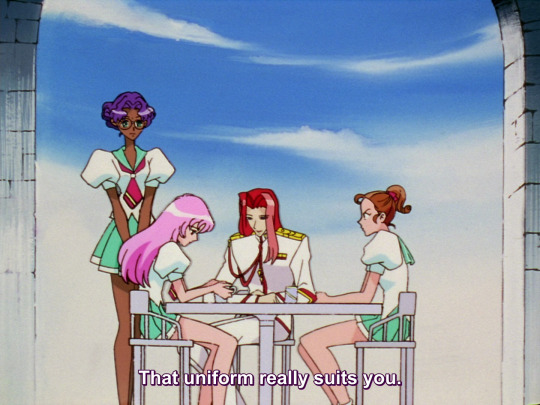
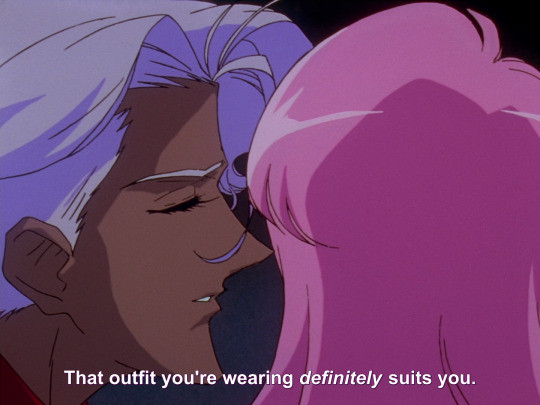
episode 12 / episode 37
there were several similarities i noted between the two episodes (12 and 34):
within the specific scenes: both touga and akio reached out and touched utena's left hand with their left hands, but touga covered her hand with his, while akio took her hand into his. in episode 12, utena and touga were accompanied by anthy and wakaba (during the day, out in the open cafeteria), while in episode 34, utena and akio were alone in akio's room (during the night); anthy was aware of it, but she was in her and utena's room and couldn't do much about the matter. anthy also couldn't do much for utena in episode 12 due to the rules of the rose seal (she was engaged to touga). also, the two scenes in episodes 12 and 34 took place after very tragic incidents happened to utena: losing the duel to touga, and consequently, losing anthy as her rose bride versus akio raping her (unarguably even more tragic).
correlation with utena's sense of self: in episode 12, utena tried (and succeeded) to take back who she was via a rematch (losing to touga made her doubt who she was as a person). who utena was as a person at this point may be referring to the role of a prince that she was able to truly embody due to her engagement to the rose bride (e.g., utena saving anthy in episode 3 from anthy's dress incident and then dancing together, utena saving anthy who was trapped in a coffin in episode 9). or, more like how the engagement with the rose bride allowed utena to be more/most like herself, one of which would be largely comprised of the princely ideals she adopted/learned and idealised (as told in her monologue of meeting the prince; utena also said she wanted to be a noble prince who saves princesses in episode 1) (i'm not sure for this part).
in episode 34, we learned the real reason utena had the rose crest ring, the real reason utena wanted to become a prince: to save a little girl suffering a fate worse than death. ultimately, in both situations (episodes 12 and 34), anthy influenced utena's sense of self, to an extent. regarding the prince, taking into account the context of episode 11, i'm quite sure utena still believed that touga was her prince in episode 12. meanwhile, episode 34 gave us (more) indisputable confirmation that akio was the prince that utena met in her past (this fact was heavily hinted at since episode 25). however, i don't think utena made the connection yet at that point. nevertheless, as a whole, in both situations, touga and akio were framed as utena's prince (to utena [episode 12] versus to the audience [episode 34]).
a common conflict/theme underlying both scenes was the pressure of conforming to ideal gender identities and presentations. this was evident in the scene with touga (complimenting utena's girl uniform and asking her out). however, it's infinitely more severe with akio because he was actively grooming utena to that end; some events of this episode were just parts of the long process (in the specific scene: asking if they're friends, mentioning that she didn't take off her ring "that night," trying to kiss her). in addition, the visuals of both touga and akio somewhat covering utena's rose crest ring with their hand gestures could be seen as analogous to them trying to suppress/diminish her princely ideals/role (touga said that losing the duel gave utena a chance at being a normal girl; he then actively tried persuading utena to this end, i.e., the compliment on the uniform and the ask for a date. moreover, touga critised utena for not knowing about the true power of the rose bride when she "fancied herself as anthy's prince." also, to reiterate: akio brought up the fact that utena didn't take off her ring when he raped her while stroking the ring; he expected that that event would be sufficient for utena to take it off [give up the role of the prince]).
i think episode 12 is an interesting foreshadowing/parallelism of some kind for later events in the final arc, with regard to utena/touga/anthy and utena/akio/anthy dynamics.
#very literal observations of the two scenes and episodes#touga mirrored akio very often#revolutionary girl utena#shojo kakumei utena#shoujo kakumei utena#rgu#sku#utena tenjou#anthy himemiya#touga kiryuu#akio ohtori#wakaba shinohara#analysis#i'm very sorry if it's difficult to follow english isn't my first language#this is the first time i wrote something like this#please correct me if i'm wrong at any parts#this write up is inspired by countless amazing rgu posts i have read#✮
125 notes
·
View notes
Text
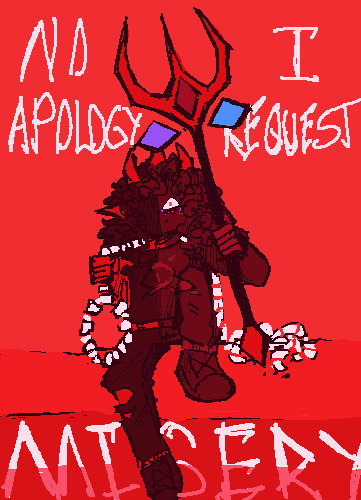


Figured I should post these here too! These are pieces for a daily account I'm a part of over on Twitter and all three have finally posted :]
All done in MS Paint, btw
#purplearts#chonny jash#chonnys charming chaos compendium#cccc#cj soul#noose imagery#scopophobia#eyestrain#PLEASE IGNORE THAT LANGUAGE IS MISSPELLED IN THE SECOND IMAGE I CANT BE BOTHERED TO FIX IT FOR THESE POSTS#also the gaps in lyrics are intentional#on twt the missing lyrics are for the captions but the formatting would look strange here so im not adding it#ALSO i know its 'on jesus' but I like oh jesus better here#anyways. yeag. art#the first was a pain because i accidentally used the anialiasing brush that forced me to manually erase everything#the other two went pretty smooth sailing though#im. gonna stop rambling in my tags now goodbye :D
149 notes
·
View notes
Text

Yeehawgust 2024
Day 13 - Where the Buffalo Roam
UN. BELIEVABLE.
Text
Buffalo buffalo Buffalo buffalo buffalo buffalo Buffalo buffalo.
BUFFALONIAN BISON THAT OTHER BUFFALONIAN BISON BULLY ALSO BULLY BUFFALONIAN BISON…
you got it.
#my art#my utmv art#utmv#undertale au#westerntale#yeehawgust#western au#yeehawgust 2024#cowboy au#has anyone heard this sentence?? Its insane the english language is crazy#Catching back up so theres TWO posts today#this reminded me of them
75 notes
·
View notes
Text
Season 6 gang (two + jamie + zoe) literally Thee physically affectionate tardis team. these mfs were constantly holding hands, hugging, leaning on each other, straight up clinging, climbing each other like jungle gyms, and nothing was stopping them. they are cats, they are pack bonded, they are a package deal, etc. keep together do not separate
#doctor who#classic who#second doctor#jamie mccrimmon#zoe heriot#i know how much we like to focus on two & jamie’s clinging but it’s the same with zoe!!!#they are all just some silly dudes with touch as a love language!#their cuddle piles are legendary#post sponsored by that forehead kiss two gives zoe in war games that KILLS ME every time#anyway highly recommend rewatching the mind robber one day. like I’m not joking.#every damn scene these three are hashtag clinging#you love to see it
186 notes
·
View notes
Text
Law not even realizing how exciting the alliance was to Luffy will never be not funny. He literally approached Luffy first and proposed the alliance with a twelve-step program to defeat one of the four emperors then expect the other captain to be normal about it? Expect Luffy, who planned to pick a fight with the Yonkos and already succeeded way back in Fish Man Island, to be rational and serious about it? For Luffy, that further confirmed that Torao is indeed a good guy aside from helping him out two years ago, giving animal legs to those who can't walk in Punk Hazard, and the cherry on top: for presenting signposts to achieve what he wanted, finally having directions on how to go at it instead of barreling his way like he usually does. Luffy doesn't follow instructions and the plan, sure, but he sticks to those signposts with stubbornness and even Law had come to begrudgingly accept throughout the alliance that Luffy's recklessness wielded far better results than what he initially expected. So really, Law still not realizing the relevance of what he did to Luffy and even insisting that they're only allies, not at all friends, etc. is amusing because he was laying out the stars aka the alliance aka the plan to take down Kaido to Luffy in the middle of the harsh snows in Punk Hazard and on top of everything that has happened to them prior, wonders why Luffy likes him so much. The alliance was a whole ass love language and Law doesn't even figure it out or he's in too much denial to acknowledge it.
#one piece#lawlu#monkey d. luffy#trafalgar law#luffy#law#these two are in love and doesn't even know it#law's love language is keeping everyone safe tbh#even his plan on taking down doflamingo didn't involve the strawhats directly dealing with him#while not giving qualms on sacrificing himself#it's the same with luffy too#except luffy cuts into the heart of the problem#and depends on others as well as will carry everything to keep them safe#anyway I should write a separate post about it#because it's another discussion entirely#mochiajclayne.txt
108 notes
·
View notes
Text



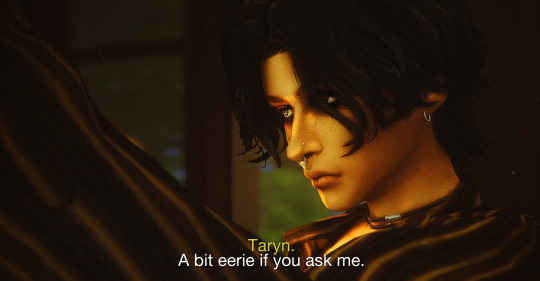
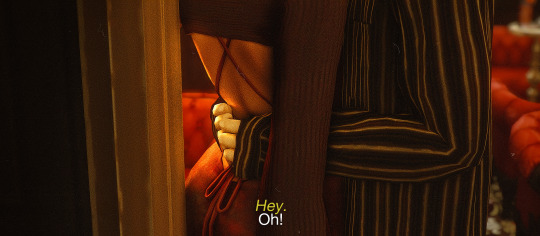


hey moon,
it's just you and me tonight
everyone else is asleep
#taryn's mind just wandering and thinking up good story plots over an empty train meanwhile atlas is like PLSPLS LET'S MAKEOUT PLSPLS-#also peace offering for this weeks posts#and also to hold me over because they aren't seeing each other for A MINUTE !#also in my little brain i feel like these two would learn each other’s native language well more like taryn would learn french bc atlas is#trilingual probably learned italian too at this point#i said also three times#anyways i think in the far future we’ll have a traveling arc especially with the new world being released#oc: taryn#oc: atlas#ts4#simblr#show us your sims#sims community
125 notes
·
View notes
Text
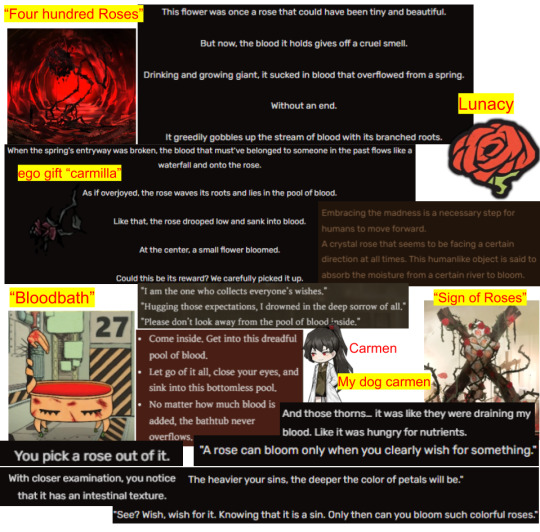
Carmen and roses
i made this to be compared with canto 6's epilogue
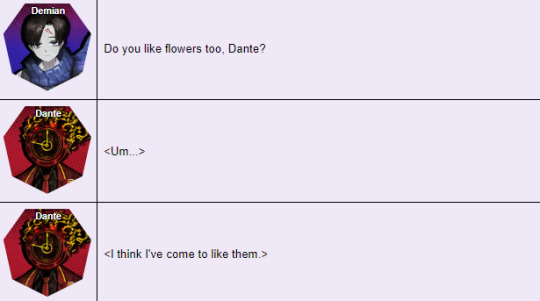
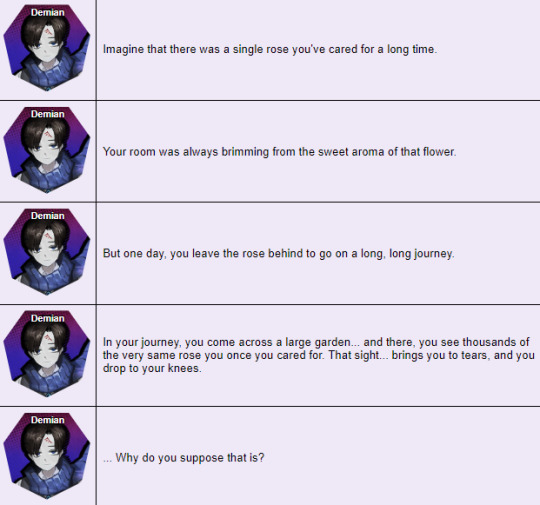
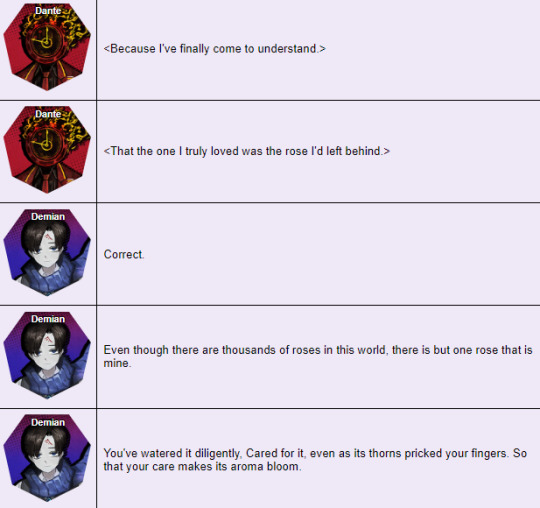
#carmen#lobotomy corporation#limbus company#dante#red string board#posted this on twitter few days ago forgot to put it here Will do now! im doing it!#with lunacy being dante's roses (literal) i wonder if. i wonder if carmen is dantes r....#carmenposting#imrealising i have the carmen posting tag AND trhe string board tag i gotta choose one#bloodbath isnt rose related btw shes just there cuz i noticed her similarities in language to 4hundred:)#im still working on the bigger carmen limbus powerpoint! its just been a while and im getting embarrassed at my own self#and i still havent done two fights i feel i need to do first....grah#its mostly about comparing carmen to abnormalities it was originally supposed to focus on the theory of carmen wanting or getting a new#physical body but i got carried away just pointing stuff out...
79 notes
·
View notes